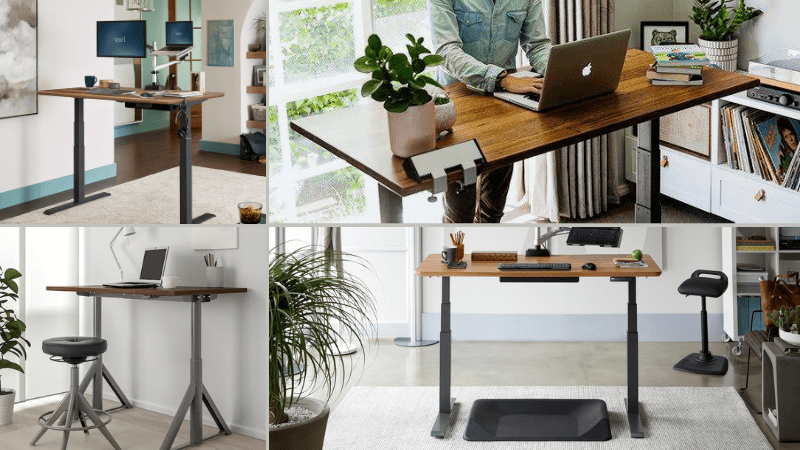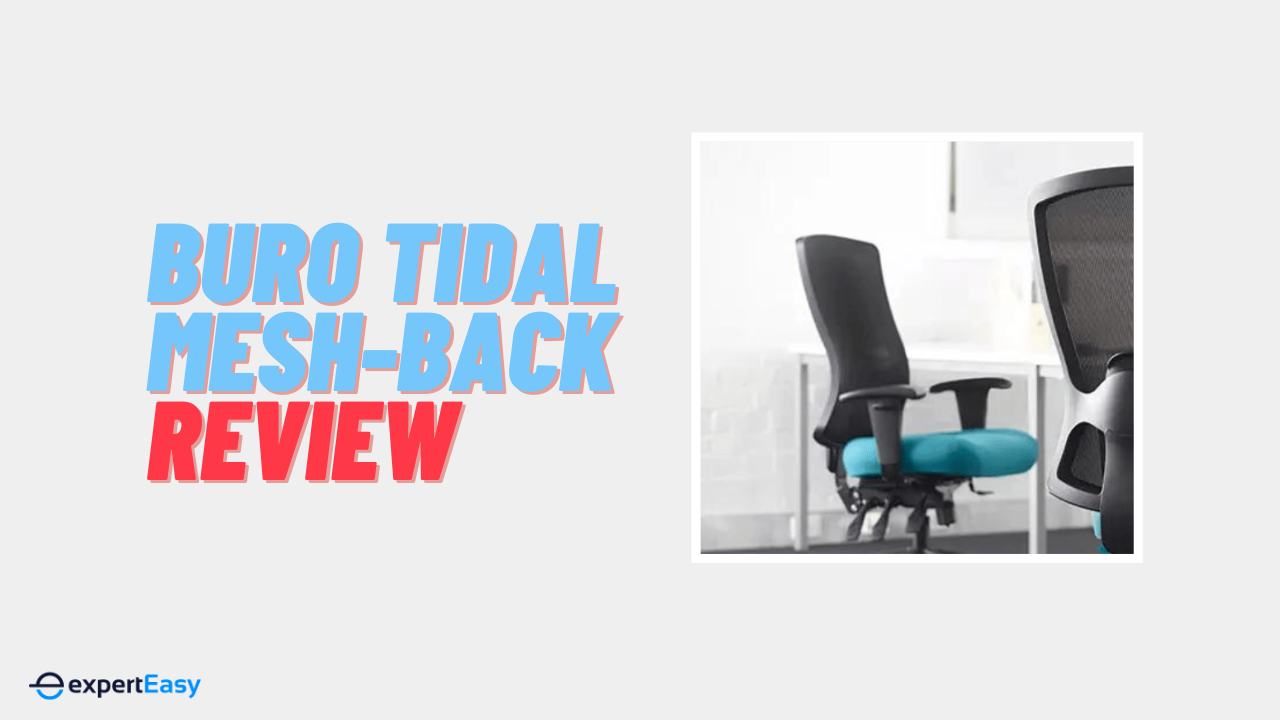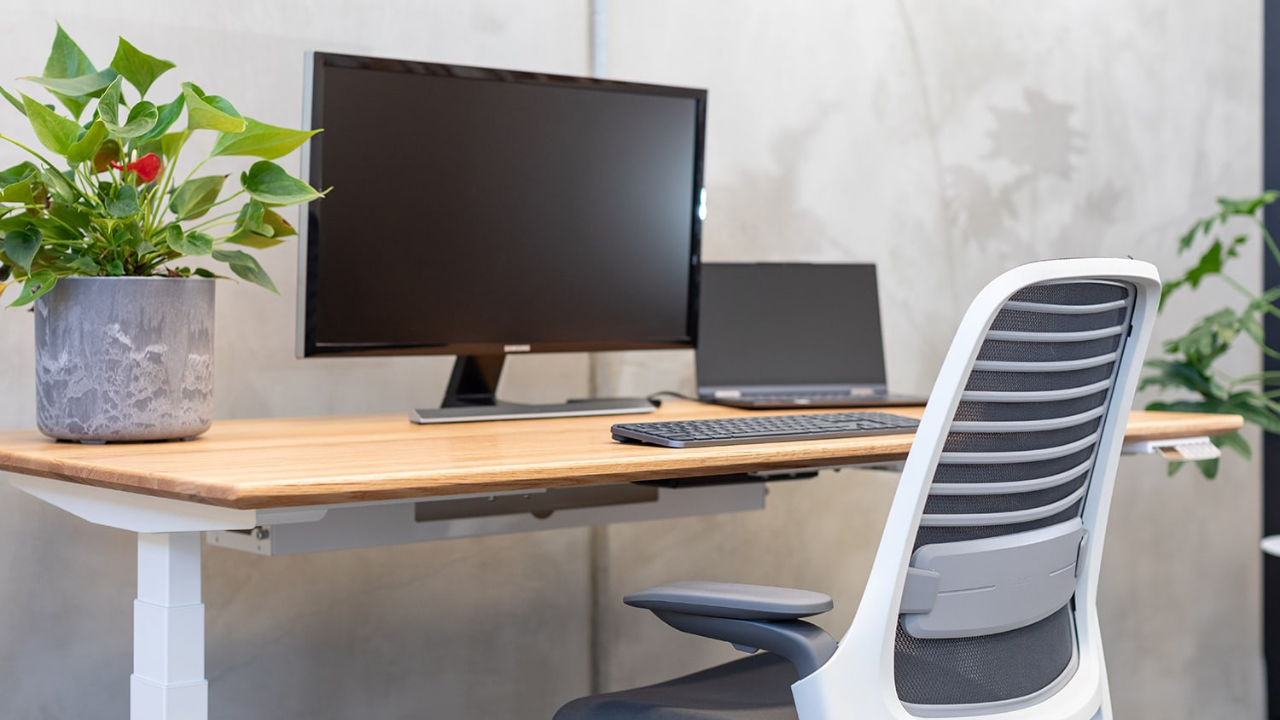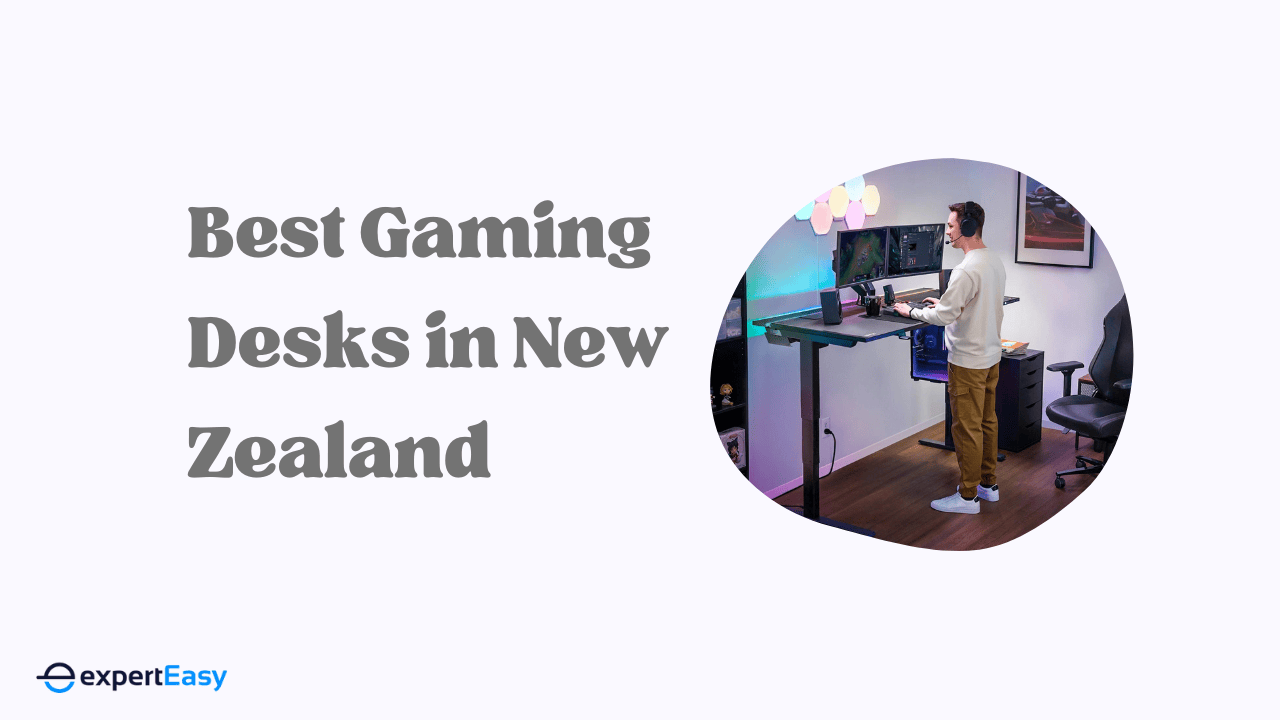If you want to buy a desk in Australia, one that allows you to sit and stand is best for comfort and productivity. This guide is a roundup of the best available options, first compiled when I purchased my first standing desk.
I have personally assembled and long-term tested all of the top six desks below. It's become a helpful guide that I keep updated for first-timers and many others looking to make the switch.
My Top Picks
If you need to make a quick purchase, here are my top recommendations. Each desk has been available on the market for years and has made numerous tweaks over time to perfect its desk offering.
They are all reliable, differing mainly in desktop design and colour options, features, and the trade-off between lifting speed and weight capacity. You really can't do wrong with any of the options below.

UpDown Pro Desk
Best overall standing desk in Australia with a 150 kg dynamic weight capacity, 61.5 - 127.5 cm height adjustment, 3.2 cm/s lifting speed, and built-in anti-collision and auto shut-off.

Desky Dual Stand-Up Desk
Best standing desk for cable management with a 140 kg dynamic weight capacity, optional scallop design and power channels.

Artiss Standing Desk
Best cheap stand-up desk with a 100 kg dynamic weight capacity, two desk types and sizes, and four colour options and finishes.

Stand Desk Pro
The fastest lifting desk with a speed of 8 cm/s - the speed trade off resulting in a lower 100 kg dynamic weight capacity, eco-friendly build, good cable management, and smart features.
Top 16 Standing Desks in Australia
I evaluated each desk’s performance over many factors and there is a rating table at the end of each product review to help you compare easily.
They include:
- Build materials used in the desk's construction, the build quality, and the desk's long-term reliability.
- Initial purchase price, and any additional expenses, such as delivery or assembly fees incurred.
- Comfort, which because is relative, I assessed how well the desk accommodates ergonomic and adjustable needs.
- The desk's look and feel (including colour options and finishes) and how it fits into your workspace.
At the end of this article, I share the full details behind my ratings.
1. UpDown Pro Desk
Overall, the Best Standing Desk in Australia
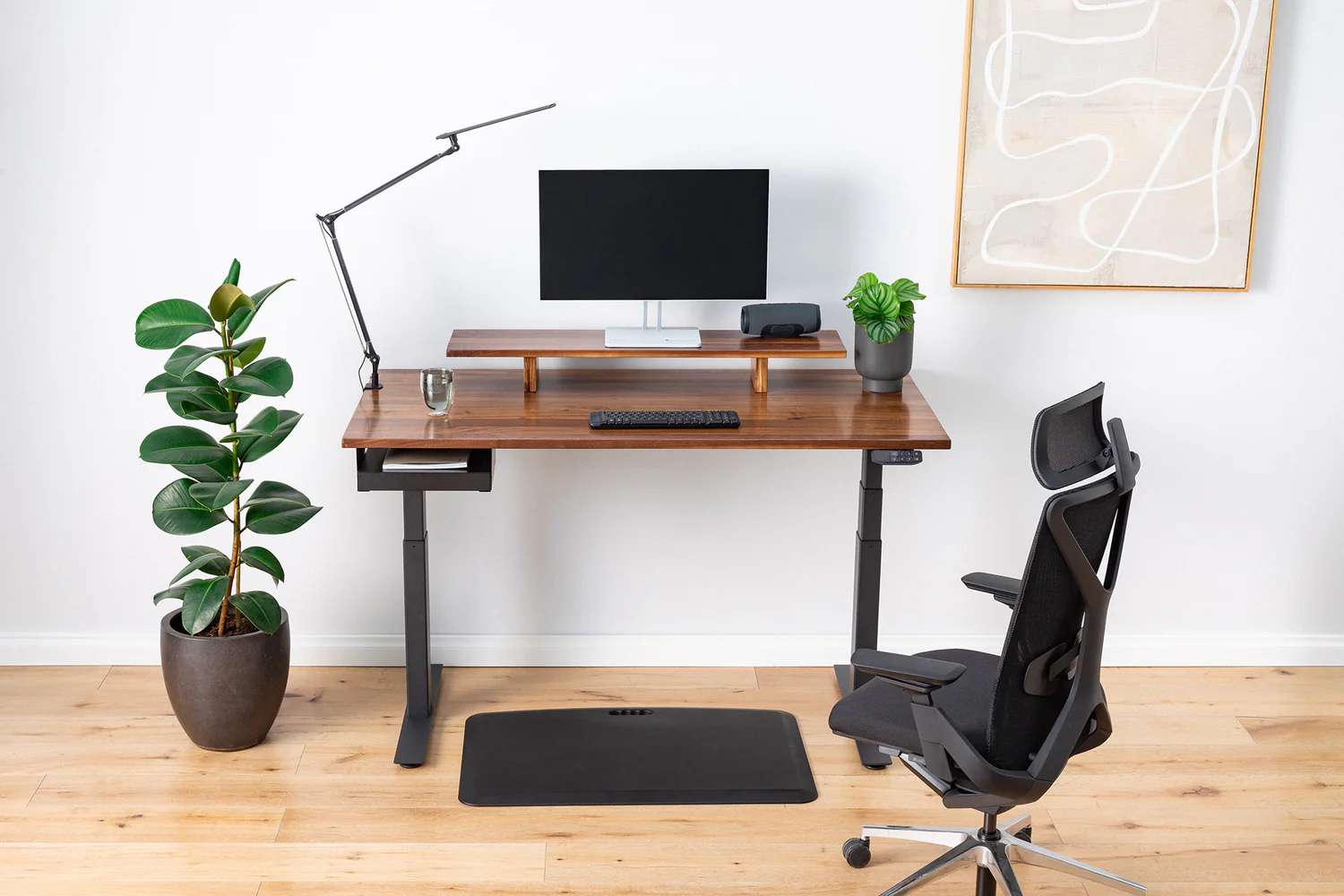
Desktop size: Up to 180 cm × 75 cm
Adjustable height: 64 - 129 cm
Lifting speed: 40 mm/sec
The UpDown Pro Desk takes first place in my review of the best standing desks in Australia, offering a wide range of options in a reasonably priced package. And it's not without competition, as you'll come to see.
Why is the UpDown PRO Desk the Best in Australia?
I have the UpDown Pro Desk as the best overall standing desk in Australia for several reasons.

First, the 100-day money-back guarantee offered across the UpDown series is a strong reason to add them to the top of your list. It allows you to experience the sit-stand desk with complete peace of mind. And should you wish to return it, UpDown will cover the cost.
In its return policy, UpDown insists that the desk be returned in its original package and not modified beyond "drilling the required screw holes for the controller or cable tray." The money-back guarantee also only covers the cost of the product, not the installation or shipping fees incurred.
Alongside its generous return policy is an even more generous warranty; an offer I've come to expect from high-end standing desks. The UpDown Pro Standing Desk ships with a 10-year warranty that covers the desk frame and all electrical components.
The third reason the UpDown Pro is the best overall is its build quality. Its steel frame weighs 41 kg, the heaviest standing desk frame I found during my research, and can support a desktop load of up to 150 kg. It's also more stable and has a thicker powder coating than its rivals.
Then, there's the desktop material and finish. UpDown Desk is the only Australian sit-stand desk supplier with the option of locally manufactured timbers. You get high-quality, eco-friendly desktops crafted from sustainable and locally sourced resources. These ranges include Australian-sourced Messmate, Victorian Ash, Walnut, Bamboo, and Rubberwood.
I rate Pheasantwood and Messmate as the more attractive options, followed by Victorian Ash and Acacia. UpDown Desk added five desktops, including American Oak, Natural White Oak, and Carbon Fibre.
Of course, you are unlikely to choose solid wood desktops for an Australian office fit-out with numerous standing desks for office work, primarily due to the cost. However, for individual or home office purchases, hardwood desktops are the best option for long-term reliability.

Now, let's talk features. The UpDown PRO has and is:
- An adjustment speed of 40 mm per second.
- Powered by dual motors for smooth adjustment.
- Safety features like anti-collision detection and child lock functions.
- UpDown Desk Controller app to control height settings.
- A power-saving mode and lockable drawer.
Besides these, there are many personalisation features.
For example, if you plan to share your UpDown Desk with other people, you can save your preferred table heights for sitting and standing to its four programmable memory buttons on the control panel.

UpDown's control panel features up/down buttons for precise minute adjustments and a USB-A plug-in port, allowing you to conveniently charge your devices and accessories while using the desk. UpDown's new controller can also be connected to the UpDown Desk Controller app through bluetooth to adjust the desk's height settings and reminder functions remotely.
You can choose from three desktop sizes, caster wheels, handy lockable drawers, and monitor arms, to build a personalised desk that is tailored to your needs. All of these personalisation features are what come together to give the UpDown PRO an edge over its competitors.
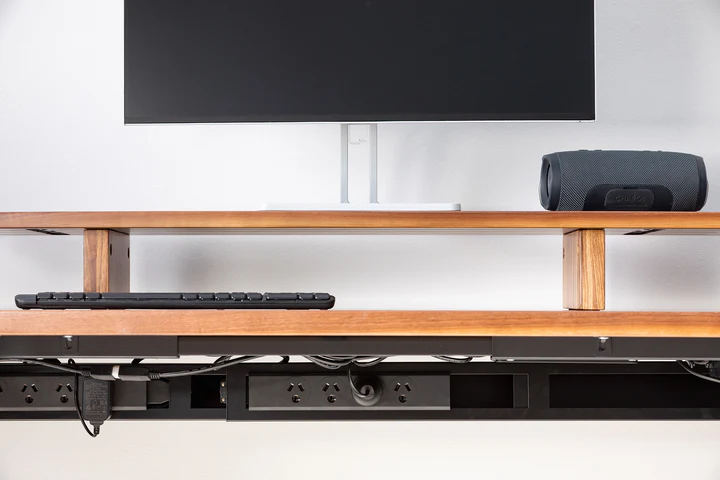
Another upside to getting the UpDown is that it offers many other accessories for cable management and desk organisation. The sit-stand desk ships with a Cable Management Tray, cable ties and clips.
For the best setup, I suggest getting the Integrated Cable Tray. It helps keep your desk tidy. It can slide and stretch up to 160 cm long. You can also plug in up to 12 devices using easy, click-in power boards.
Cons of the UpDown Desk
With the wide range of desktop options and accessories available, it's easy to end up spending more than your original budget if you choose the most stunning hardwood desktop and then go about adding many of the options, such as a power rail, a slimline metal drawer, or a cable tray.

The cable management options are great for most people, but if you have a whole lot of cables, they might not be as suitable for you as the Desky options (see review below). In a recent upgrade, the UpDown cable management tray now has a side that unhooks for ease of use.
UpDown's cable management tray is available at an additional cost, although it's often bundled with desk promotions. You also need to pay for a set of grommets. However, the UpDown team is happy to drill the grommet holes for you. I recommend this to avoid voiding the 100-day money-back guarantee.
Lastly, the desk may not be suitable for smaller home offices, as only one depth is available, at 75 cm. If you have limited space in your home office, consider the Desky Dual Stand-Up Desk.
The Verdict

If you love solid hardwood furniture, then select one of the hardwood desktop choices for your UpDown Pro desk; you will not regret it.
The hardwood is excellent to touch and beautiful, and is slightly thicker than the other finishes. I ranked the UpDown PRO against the other height-adjustable desks here. Here's how it performed.
| Category | Rating (5.0) |
|---|---|
| Build Quality | 4.9 |
| Aesthetics | 4.6 |
| Cable Management | 4.4 |
| Customisability | 4.5 |
| Weight Capacity | 5.0 |
| Lifting Speed | 4.3 |
| Ease of Assembly | 4.0 |
| Value for Money | 4.6 |
| Return Policy | 5.0 |
| Warranty | 5.0 |
| Overall | 4.6 |
UpDown Pro Price
The UpDown PRO desks start at around $900 with a Melamine desktop and could cost you more than $2,000 once you choose hardwood and several optional extras. It's not cheap, but you 100% get what you pay for.
2. Desky Dual Stand-Up Desk
Best Standing Desk for Cable Management

Adjustable height: 60 - 125 cm
Desktop sizes: Up to 200 × 75 cm
Lifting speed: 36 mm/s
The Desky Dual Standing Desk is available in four sizes, five desktop materials, and over 35 desktop colours. I recommend the medium size, 150 x 75 cm, for most people, whereas the extra large size, 200 x 75 cm, perfectly suits professions that require a wider desktop surface.
Like many high-end standing desks, the Desky Dual is comparable to the UpDown and Stand Desk PRO. In fact, I had Desky and Stand Desk Pro tied for second place in the last update to this article. Since then, Desky has made a few notable improvements (including more desktop options and better availability) that now put it ahead of the Stand Desk PRO.
The Stand Desk PRO, in turn, only offers two hardwood options in addition to its bamboo desktop; more on that later. Stand Desk also has a habit of always being out of stock, so you'll almost always need to pre-order. If you don't mind the wait, this does not detract from the desk's overall quality.

In the following sections, I compare the Desky Dual head-to-head with the UpDown PRO to provide a detailed view of its similarities and differences. Spoiler alert? There isn't much between the two.
To begin with, the Desky Dual Desk is slightly less heavy-duty than the UpDown Pro. It weighs 36 kg and supports up to 140 kg, featuring a dual-motor lifting system and a height range of 60 to 125 cm.
In contrast, the UpDown Pro has a sturdier 41 kg frame and a higher weight capacity of 150 kg. It offers a slightly different height range, adjusting between 64 and 129 cm. Both sit-stand desks use a dual-motor dynamic lifting system for a reliable operation at maximum capacity.
Smaller margins.

When it comes to desktop materials and options, Desky offers a wider variety than most. You can choose from several types of wood, including some striking hardwood designs with epoxy resin cut-throughs. They’re not exactly to my personal taste, but many people love the unique, handcrafted look, and to be fair, I can see why. When paired with the right frame and office setup, those resin accents can bring colour to your space.
Available Desky desktop build materials include bamboo, hardwood, melamine, rubberwood, and softwood. While similar to the UpDown PRO, Desky does not offer native Australian hardwoods. If you prefer a similar look, consider the oak, walnut, or natural walnut desktop options.

The Desky Sit-Stand Desk does not come with cable and power channels; these are optional accessories that can be added. Desky's offers an integrated cable and power channel for $288.90 that accommodates up to ten power sockets.
By comparison, UpDown’s integrated cable tray is priced at $279.00, holds up to twelve power sockets, and comes with a full cable management kit that includes ties, clips, and an organiser.
Where Desky has a slight edge is with its optional scallop design at the back of the desk. The scallop, essentially a cut-out along the rear edge, allows cables to run neatly down the back, enabling you to position the desk flush against the wall without clutter or obstruction.
Again, smaller margins.

Like the UpDown PRO Desk, the Desky Dual also offers a trial period, but it falls well short of UpDown’s generous 100-day trial. Desky gives you just seven days from delivery to return the desk.
While that difference alone clearly gives UpDown the edge, the conditions make the gap even wider. Desky’s return policy only applies if the desktop hasn’t been attached to the frame, meaning it’s really only useful if you change your mind before assembly. In contrast, UpDown allows returns even after the desktop has been screwed to the frame.
The manufacturer, however, matches UpDown on warranty; both manufacturers offer a 10-year warranty. UpDown's warranty covers
"the desk frame, all electrical components, and any material faults in the desk frame that prevent the normal use of the desk."
whereas Desky
"will determine whether a repair, replacement part or replacement product is provided and will be responsible for the cost of any such repair, replacement part or replacement product."

The Desky Dual Desk features four programmable presets, allowing you to save your preferred height settings for quick access. In 2023, Desky updated its control panel, adding Bluetooth connectivity for remote operation and a built-in USB port for fast device charging. Desky's Bluetooth app is compatible with voice control through Siri and Google Assistant.
The same applies to the UpDown PRO Desk, which has also recently been upgraded to include a USB-A charging port and Bluetooth app control. However, between the two, Desky’s newer control panel feels a bit more refined and premium in design and usability.
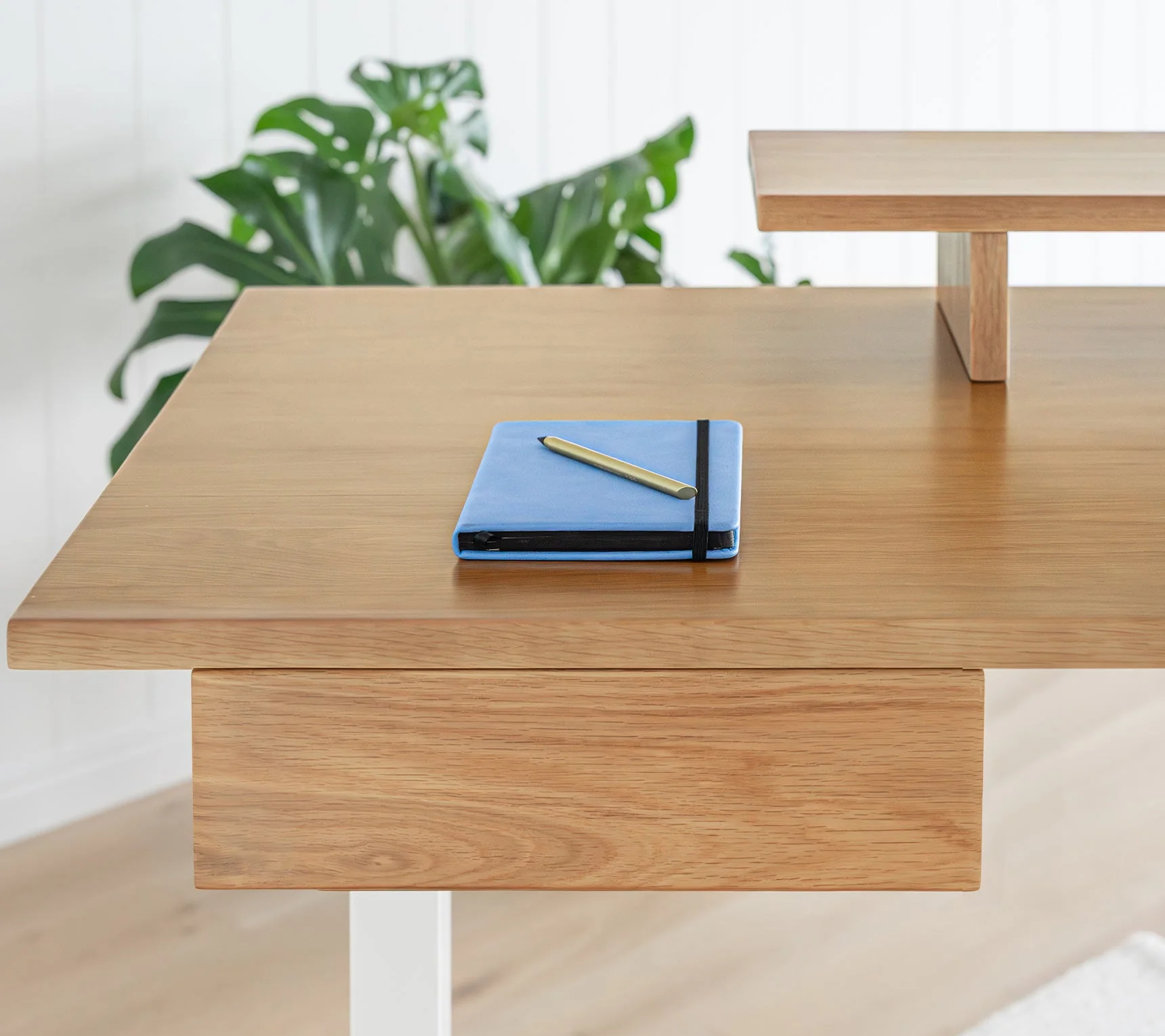
The Desky Dual Standing Desk also includes several design and safety features:
- Overload protection to prevent damage from excessive weight
- 200W transformer power, with only 0.1W power draw on standby for energy efficiency
- Quiet operation, producing around 40 dB of noise while in motion
- Anti-collision detection to stop the desk if it hits an obstacle
- Child lock for added safety in shared or home environments
Desky also offers minimal and ultra-slim under-desk drawers as optional add-ons. This provides a clean, space-saving storage solution that mounts neatly beneath the desktop, perfect for keeping small items, such as notebooks, pens, and devices, out of sight but within easy reach.
The Verdict

Desky’s range of desktop and finish options, build quality, price, cable management system, scalloped design, safety features, and thoughtful design details make it a strong choice for most people.
Its drawbacks compared to Australia’s best overall sit-stand desk, the UpDown Pro, are relatively minor: it supports 10 kg less weight, has a slightly lighter 36 kg frame (versus UpDown’s 41 kg), and comes with a much shorter 7-day return policy compared to UpDown’s 100-day trial.
See how it ranked with the others in the table below:
| Category | Rating (5.0) |
|---|---|
| Build Quality | 4.5 |
| Aesthetics | 4.4 |
| Cable Management | 4.6 |
| Customisability | 4.5 |
| Weight Capacity | 4.8 |
| Lifting Speed | 4.1 |
| Ease of Assembly | 4.0 |
| Value for Money | 4.4 |
| Return Policy | 2.0 |
| Warranty | 5.0 |
| Overall | 4.2 |
Cost of Desky Dual Desk
The Desky Dual Stand-Up Desk starts at $705 for the mini sit-stand desk and well over $2,000 for hardwood options, placing it in the same price range as the UpDown Pro. I recommend comparing prices on the manufacturer's site and Amazon for the best available deals.
3. Stand Desk Pro
Fastest Lifting Desk

Adjustable height: 64 - 128 cm
Desktop sizes: Up to 180 × 80 cm
Lifting speed: 80 mm/s
The Stand Desk Pro is a simpler desk than the two ahead of it. That's not to say it's not a durable pick; it’s strong and reliable. But it only comes in three models and three desktop materials, so choosing one is much easier.
Stand Desk's models are the Stand Desk PRO, which I'm reviewing, the Stand Desk Essential, and the Stand Desk Entry. All three ship with Bamboo, Birch Ply, and Hardwood desktop material options.
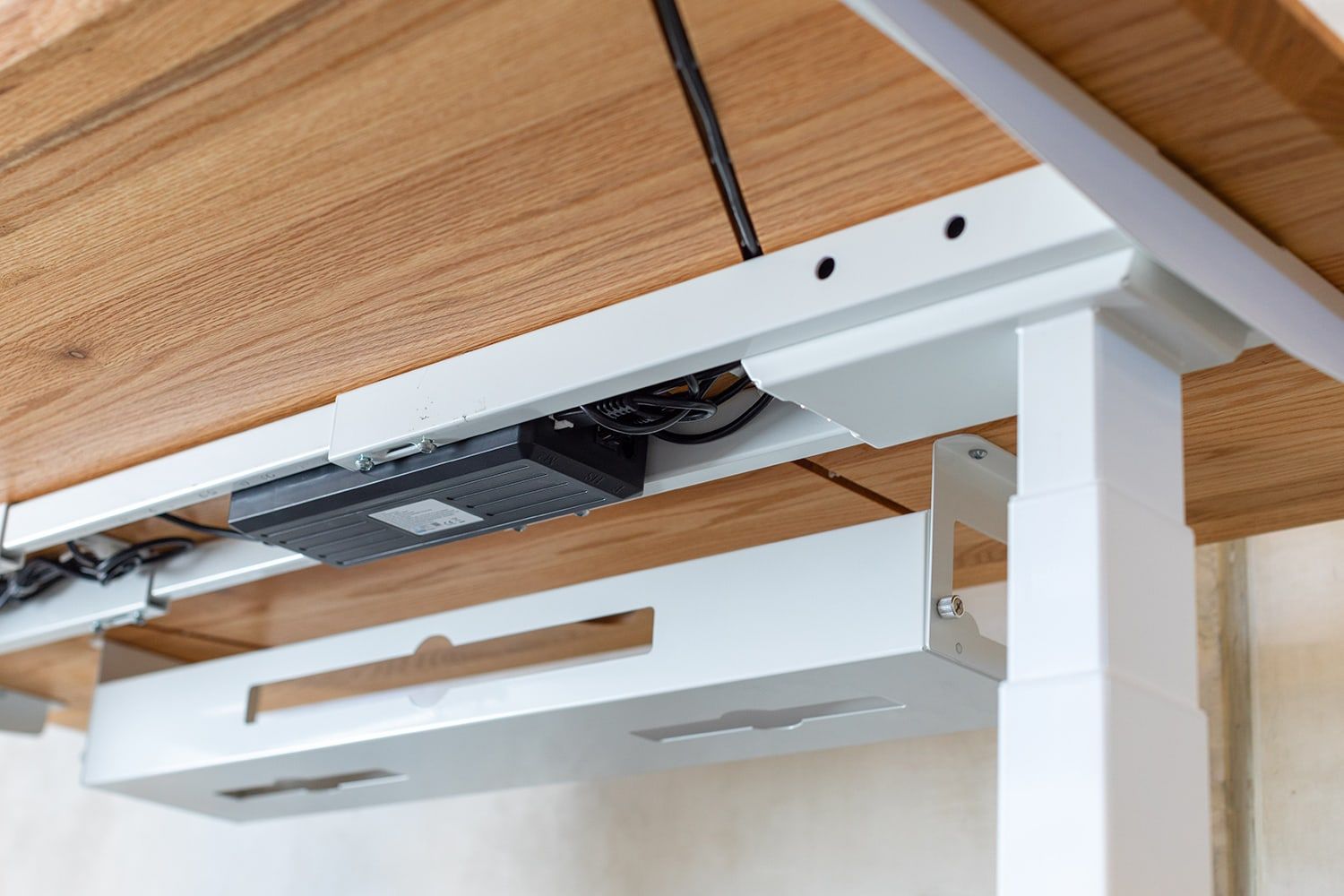
My first impression of the Stand Desk Pro on its arrival was its packaging. Stand Desk used thick cardboard, and the parts came in bags that break down naturally. Unlike most sit-stand desks, they now use protective foam only on the corners. The rest of the edges are protected with cardboard instead.
It felt cheap, but it also felt sustainable. It didn’t give a premium vibe, but the simple packaging makes sense. You get less foam and other materials that won’t harm the environment after unpacking.
Another thing worth noting was the sturdy build and design. It had a height adjustment range of 64 to 128 cm, nearly the same as the UpDown PRO, offering a comfortable range of options.
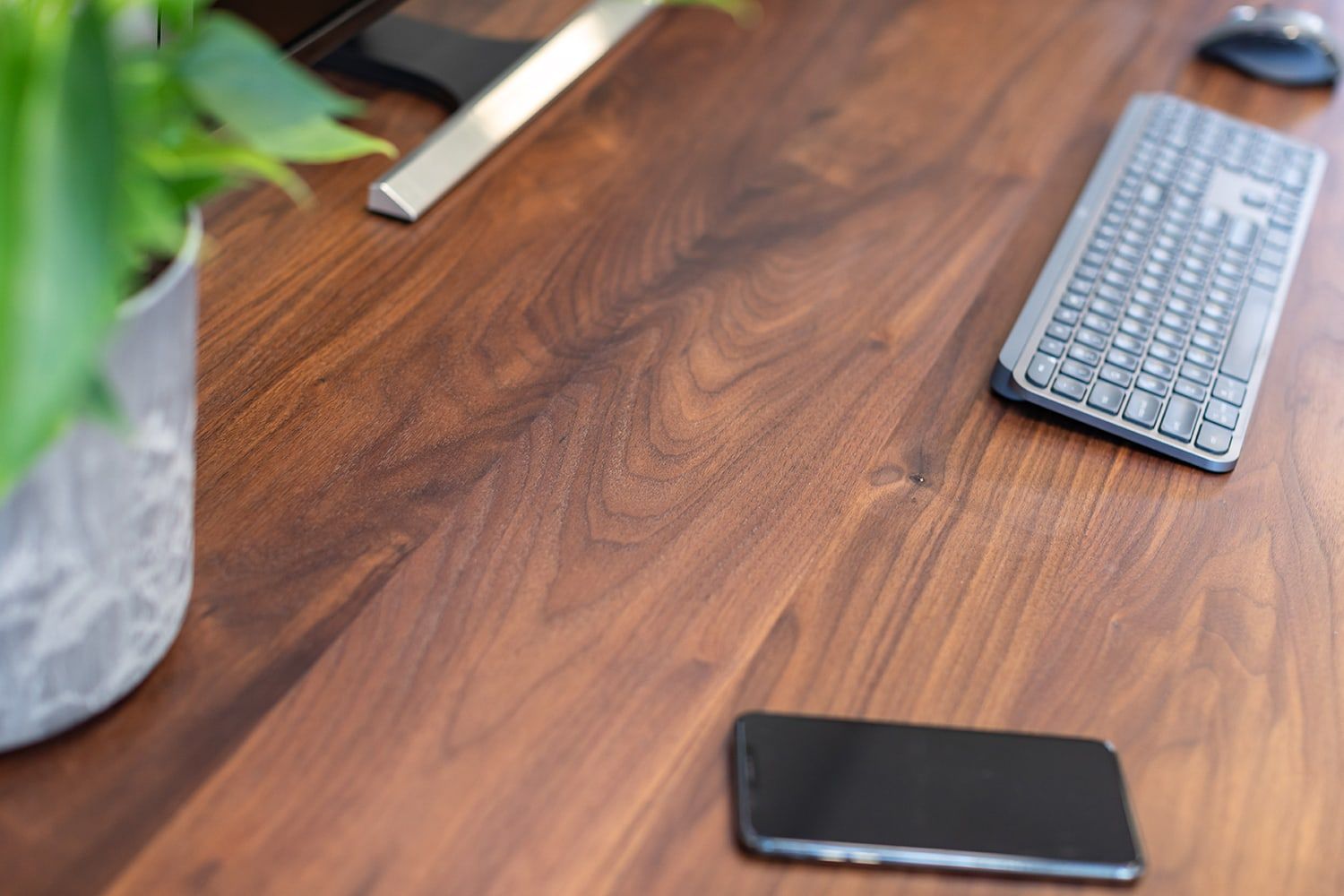
Let's look at the actual features of the desk. As mentioned earlier, the Stand Desk PRO is available in three build materials: Bamboo, Birch Plywood and Hardwood. Their support confirmed the reason for these choices:
- Bamboo is fast-growing and natural
- Birch plywood is strong and eco-friendly
- Solid walnut and oak options are long-lasting
I first reviewed the Bamboo desktop before later upgrading to the Walnut desktop option. As expected, bamboo is the lightest and most affordable of the three desk materials, regardless of the model. I recommend it as a budget alternative to the Artiss Standing Desk and FlexiSpot E7.
On the upside, Stand Desk PRO’s hardwood desks are comparable in quality to those of UpDown and Desky. Its walnut and oak tops are durable and have the same premium, solid-wood feel. However, if durability is your main deciding factor, the order is UpDown first, then Desky, and then Stand Desk, though the differences between them aren’t huge.

For desk controls, the Stand Desk PRO adjusts smoothly thanks to its two motors, making it easy to switch between sitting and standing positions. It’s the fastest on my list, lifting 120 kg at 80 mm per second.
The desk's 80 mm/s lifting speed means you can go from sitting to standing in 8 seconds. To see how fast that actually is, the Desky takes 18 seconds to do the same, while the UpDown takes 16 seconds.
Still on the controls, the Stand Desk panel lets you save two height presets so you can switch to your sitting or standing height with a tap. It also connects to the Stand Desk app over Bluetooth for setting custom sit/stand schedules, reminders, and voice control through Siri and Google Assistant.
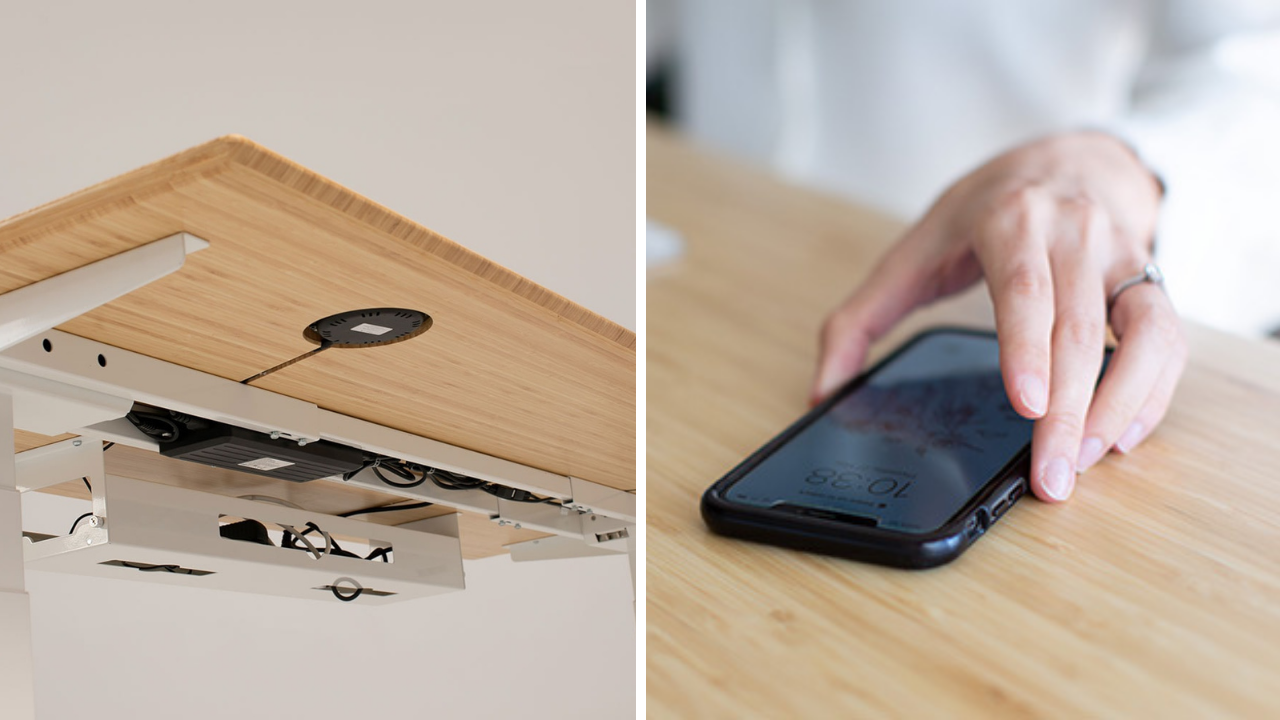
Unlike Desky and UpDown, you don’t get a USB-A port for charging your accessories. Instead, the Stand Desk comes with an innovative built-in 10W wireless charger under the desktop.
While it works, it was slower than I expected and not always reliable. It charges, but it takes longer, and sometimes you need to shift the phone around to get it to connect properly. Sometimes, it doesn’t connect at all.

To manage your cables, the Stand Desk Pro includes a free integrated cable management tray and two large grommet holes at the back of the desktop. Emphasis on free, as you have to pay for this as add-ons when purchasing a sit-stand desk from UpDown or Desky.
I recommend installing a multi-board extension inside your cable management tray and connecting all your switches to it. This way, you only have one cable exiting from the rear of the desk.
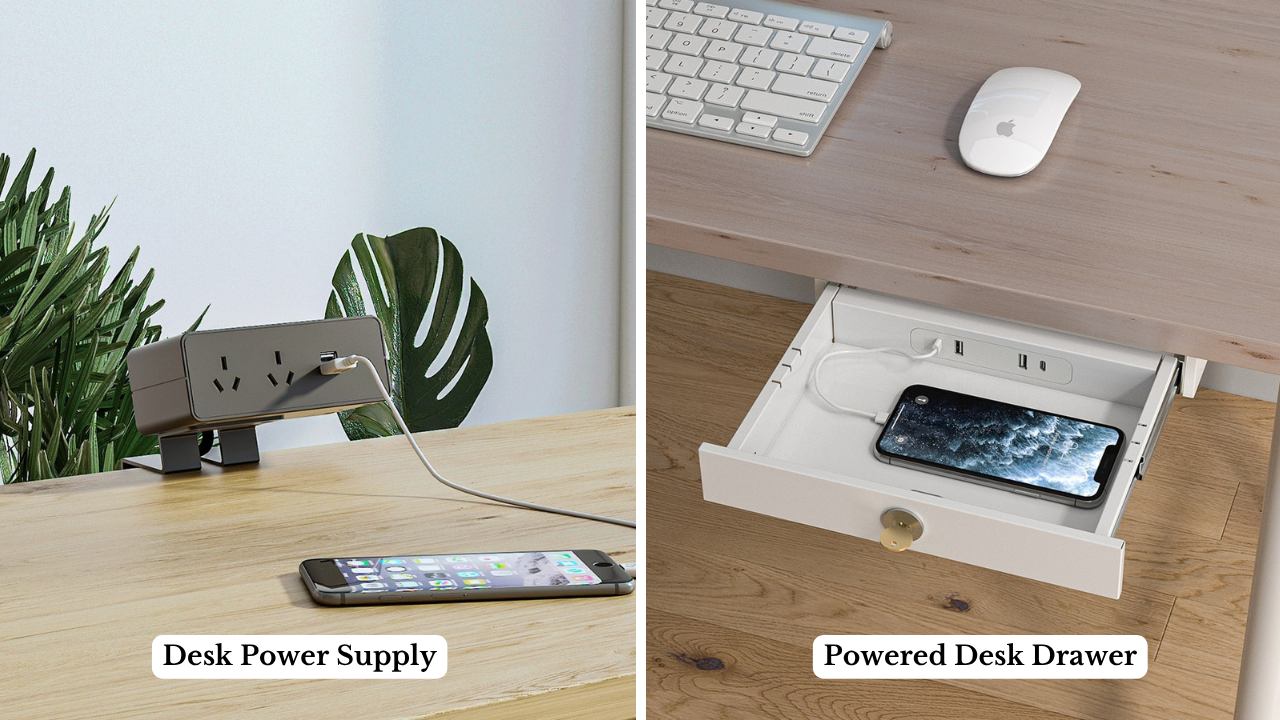
In addition to the cable management tray, you can also get the On-Desk Power Supply, which sits on top of your desk and provides two power outlets and USB-A fast-charge ports for plugging in extra devices.
Another useful accessory is the Powered Desk Drawer. It’s a small drawer with two USB-A ports and USB-C ports each.
If you don’t want anything sitting on the desktop, you can skip both accessories and rely on the built-in cable tray. With a good power board inside the tray, most people won’t need extra charging points, anyway.

Besides these, the Stand Desk PRO also ships with the standard safety features required of a high-end desk, including:
- child lock protection,
- anti-collision detection, and
- 45 dB noise level.
Also equally important are the 100-day free trial policy and 10-year warranty. Stand Desk's free return shipping and full refund are only available for purchases of a single unit. The purchased products
cannot be damaged and must be returned in the original packaging materials.The Stand Desk will [also] need to be dis-assembled and packaged as it arrived in the original packaging.
The sit-stand desk’s 10-year warranty covers all parts and components. For any warranty claim, you’ll need your order number, so make sure you keep it safe for as long as the warranty lasts.
Final Verdict
While the Stand Desk PRO has its limitations, such as buggy wireless charging and a low weight capacity, its benefits significantly outweigh these drawbacks. Here's how it compares to the competition:
| Category | Rating (5.0) |
|---|---|
| Build Quality | 4.7 |
| Aesthetics | 4.2 |
| Cable Management | 4.5 |
| Customisability | 4.4 |
| Weight capacity | 4.0 |
| Lifting Speed | 5.0 |
| Ease of Assembly | 4.0 |
| Value for Money | 4.4 |
| Return Policy | 5.0 |
| Warranty | 5.0 |
| Overall | 4.5 |
Among the three standing desks, UpDown Pro has the best overall build quality, stability, and finish. Desky Dual is close behind, offering build quality and good value, but with a shorter trial period and slower lifting speed.
The Stand Desk PRO stands out for its lifting speed, eco-friendly desktop options, and a generous 100-day return policy, although its build quality and aesthetics score slightly lower than those of UpDown.
Overall, UpDown ranks highest, Stand Desk PRO is a fast and sustainable alternative, and Desky sits comfortably in the middle.
Cost of the Stand Desk Pro
Price-wise, the Stand Desk Pro is generally in line with the Desky Dual; the cost is justified by the top-tier features, robust build, eco-friendly design, generous warranty and 100-day risk-free trial.
4. Artiss Standing Desk
Best Cheap Sit-Stand Desk

Adjustable height : 70 - 120 cm
Desktop sizes: Up to 140 × 70 cm
Lifting speed: 32 mm/s
The Artiss Sit-Stand Desk is a budget sit-stand desk. The manufacturer offers various models, but the primary distinctions are their control panels, motors, and weight capacities.
The more affordable sit-stand desk options (starting from A$290) have a single motor and a control panel with up-down buttons and two height presets. They can hold 60 kg and have a lifting speed of 25 mm/s.
On the other side are dual-motor sit-stand desks, which start at A$380, have control panels with three memory presets and a sit-stand reminder. They can hold 100 kg and have a lifting speed of 32 mm/s.

These sit-stand desks and all their variations share several key features:
- Both desks have a motorised, height-adjustable frame.
- Both have a high-quality, powder-coated metal frame.
- Both offer stepless height adjustments.
- The desktops for both options ship with pre-drilled holes and an anti-scratch finish with smooth edges and surfaces.
However, being a budget-friendly sit-stand desk, it falls short on many fronts when compared to high-end options like the UpDown Pro Desk, Desky Dual Stand-Up Desk, and Stand Desk Pro.

Let's start with the build quality. Artiss' desktops are all made from engineered wood, which contributes significantly to their low pricing. The desks are made from particleboard, a type of engineered wood, with finishes available in walnut, white, black, rustic brown, and oak.
Unlike natural wood, engineered wood, which is made from compressed wood fibres or particles, is cheaper to produce but generally less durable and less resistant to moisture over time.
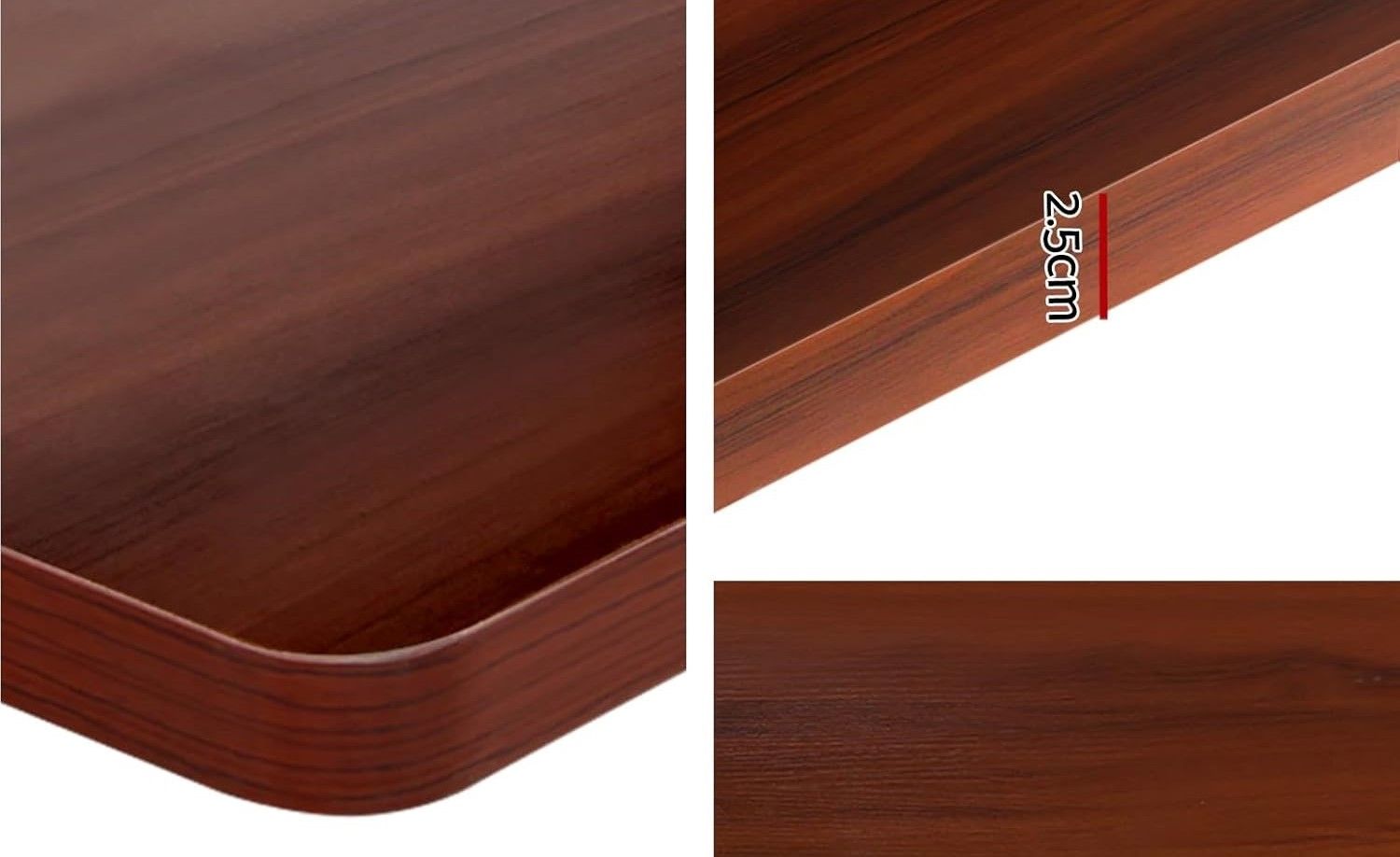
That's not to say the desktops feel cheap, quite the opposite. They have a pleasant feel, a decent height of 2.5 cm, and rounded corners and an anti-scratch finish that adds a touch of sophistication. And even more important, Artiss supports the desktop with powder-coated steel frames, which are the type of durable support found in high-end desks.
Plus, the frames are adjustable. A unique build that allows you to use the same frame for smaller desktops by adjusting it inward. This means you can reuse your frames for many years, whether you are downgrading your desktop size or upscaling to support multiple devices.
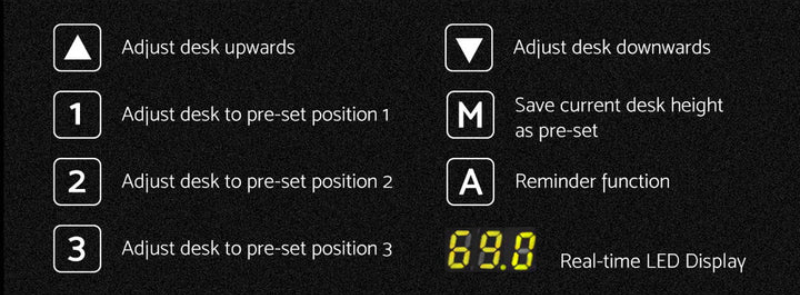
The control module that ships with the desk is also worth discussing. With three or two height presets, it falls short of the top three desks. You also do not get the fancy features, such as the USB-A port and remote height adjustments through Bluetooth connectivity. Still, it holds its own, and the adjustment buttons have a nice tactile feel from premium models.
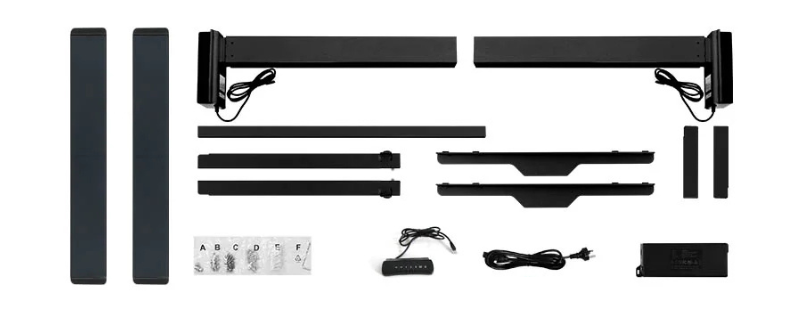
Artiss includes a few clips and ties for cable management, which is fine for light setups. However, if you use multiple monitors devices, you’ll quickly outgrow these. I was able to install the UpDown cable tray on the Artiss without any issues, and I’m confident Desky's cable tray would fit just as easily.
Artiss does not offer its own dedicated cable management accessories. The manufaturer mainly sells add-ons like monitor arms, charging mounts, and similar small accessories like cup holders.
The final area where Artiss falls short is its warranty and return policy. The manufacturer offers only a one-year warranty and a 30-day return policy for change of mind upon purchase. The policy page states that
You have the option to return at your cost any unopened, unused Artiss Product in its original packaging for any reason, within 30 days of receiving the Product.
The Verdict

While the overall look and feel of the sit-stand desk doesn’t look inexpensive, it cannot be mistaken for a high-end desk like the UpDown Pro Series, making it unsuitable for use in a luxury home.
However, the Artiss is bang on for the price point; it has been the best standing desk if you need to stick to a lower budget, and it still maintains its lead in this niche. See where it wins and loses compared to the other desks in this roundup in the rating table below:
| Category | Rating (5.0) |
|---|---|
| Build Quality | 3.5 |
| Aesthetics | 4.0 |
| Cable Management | 3.0 |
| Customisability | 3.0 |
| Weight Capacity | 4.0 |
| Lifting Speed | 4.0 |
| Ease of Assembly | 3.5 |
| Value for Money | 4.8 |
| Return Policy | 1.0 |
| Warranty | 2.0 |
| Overall | 3.2 |
Cost of the Artiss Desk
The variations of the Artiss Sit-Stand Desk are priced higher on the manufacturer's site than they are from the reseller sites. The deals change between sites, but you can find the best deal using the button below.
5. Secretlab Magnus Pro/Pro XL
Best Standing Desk for Gamers
Adjustable height: 65 - 125 cm
Frame weight: 25.5 kg
Lifting speed: 30 mm/s
For a gaming standing desk, I recommend the Secretlab Magnus Pro/Pro XL. These are high-end gaming-focused models that combine motorised height adjustment with Secretlab’s well-known cable management ecosystem.
The desk comes in two sizes. The standard Magnus Pro features a desktop surface measuring 150 × 70 cm, for most single or dual-monitor setups. The Magnus Pro XL, on the other hand, offers a larger 177 × 80 cm surface for ultrawide monitors, multiple peripherals, or simply a cleaner layout.
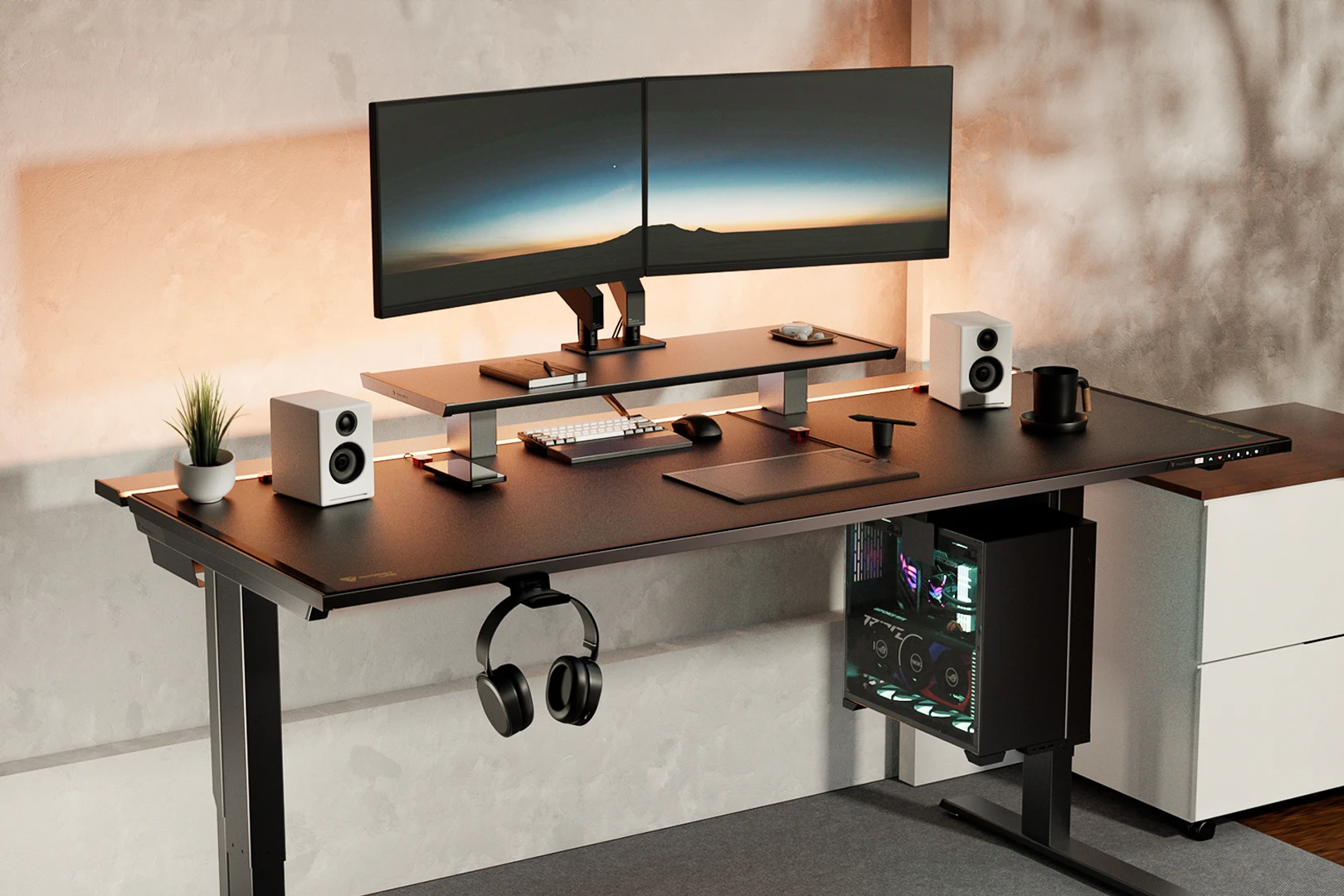
Let’s start with the build quality, just as we’ve done with the other desks. The Magnus Pro is built on a steel frame and uses a full-metal, powder-coated desktop surface. Under that metal exterior is an MDF core reinforced with steel and aluminium for a durable and premium feel.
This differs from hardwood desktops, which rely on natural wood for both strength and aesthetics. Hardwood offers a warm, organic look and is suited for office environments. In contrast, metal-over-MDF construction has a more uniform surface that won’t warp, crack, or develop inconsistencies over time, making it an ideal choice for gaming desk surfaces.
The hinged rear cover follows a similar construction approach, i.e., MDF with steel and aluminium to ensure it remains sturdy and operates smoothly. The desk is available in two finishes: black and white, both of which complement minimalist or RGB-heavy gaming setups well.

In terms of strength, the Magnus Pro has a maximum load capacity of 120 kg, which already accounts for the weight of the metal desktop and the frame. Height adjustments are handled by a dual-motor system with a lifting speed of 30 mm/s. It’s not the fastest mechanism you’ll find, but it remains smooth, steady, and reliable for everyday use.
For the control panel, you get a built-in capacitive touchscreen to view the current height setting and three preset height options for your preferred sitting and standing positions. You also get an anti-collision system to protect the desk and anything around it while it moves.

Unlike most office standing desks, Secretlab includes a full-length cable management tray as standard. It runs the entire width of the desk, providing ample space to conceal your extension strip, monitor cords, and power cables. You can access it easily from the top by lifting the rear cover.
Secretlab also supports this with an incredible cable management ecosystem. Magnus offers a range of dedicated modular accessories, monitor arms, cable anchors, sheaths, fastening straps, and many others to maintain a tidy, organised workspace without visible cable clutter.
This is one of two main areas in which the gaming standing desk outshines the rest of the sit-stand desks on the Aussie market. The second is the range of accessories and customisation options available.
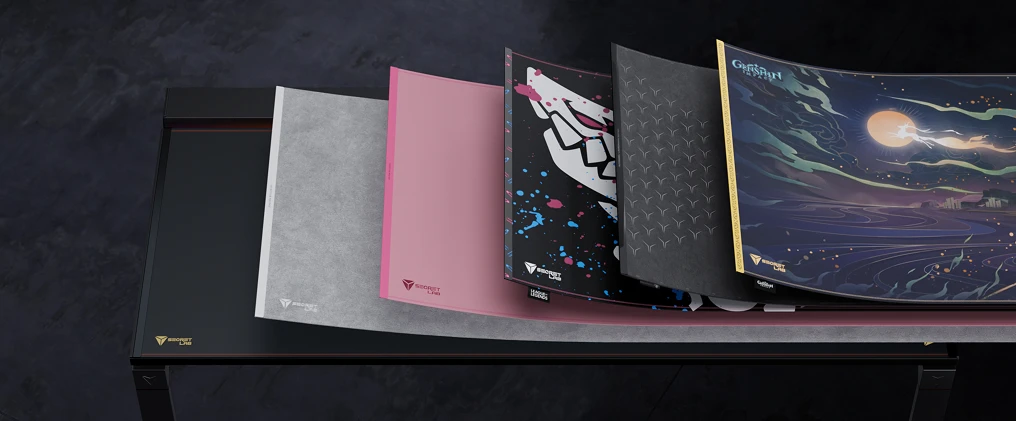
Secretlab offers a wide range of optional add-ons. These include single and dual monitor arms, a high-end PC mount, a magnetic headphone hanger, a LAN cable extension, magnetic cable sheaths and anchors, fastening straps, and a complete cable management bundle.
Personalising your desk is even easier with the MAGPAD system, which offers 14 different desk mats to choose from. This also means you can replace your desktop mat if it is worn out. The gaming desk supports a multi-colour magnetic LED lighting system for an immersive ambience.

The final bit of comparison is the warranty and return policy. Secretlab offers a 2-year warranty on the electronic control panel and electrical control box, as well as a 5-year warranty on all other parts of the desk, excluding accessories, which have warranties ranging from 6 months to 3 years.
The return policy allows you to return the Magnus PRO within 49 days of delivery. This means that you can trial the desk. However, unlike other high-end desks that accept the shipping cost of return, Secretlab insists that:
You must pay the shipping cost of returning the goods. Damage fees (up to the price of the product) may [also] apply if returned goods are missing parts or damaged.
The return policy "only applies to consumer purchases", which is a fancy way of saying it only covers single-desk, non-business purchases. I recommend familiarising yourself with both policies before purchase.
Secretlab Magnus Pro Rating
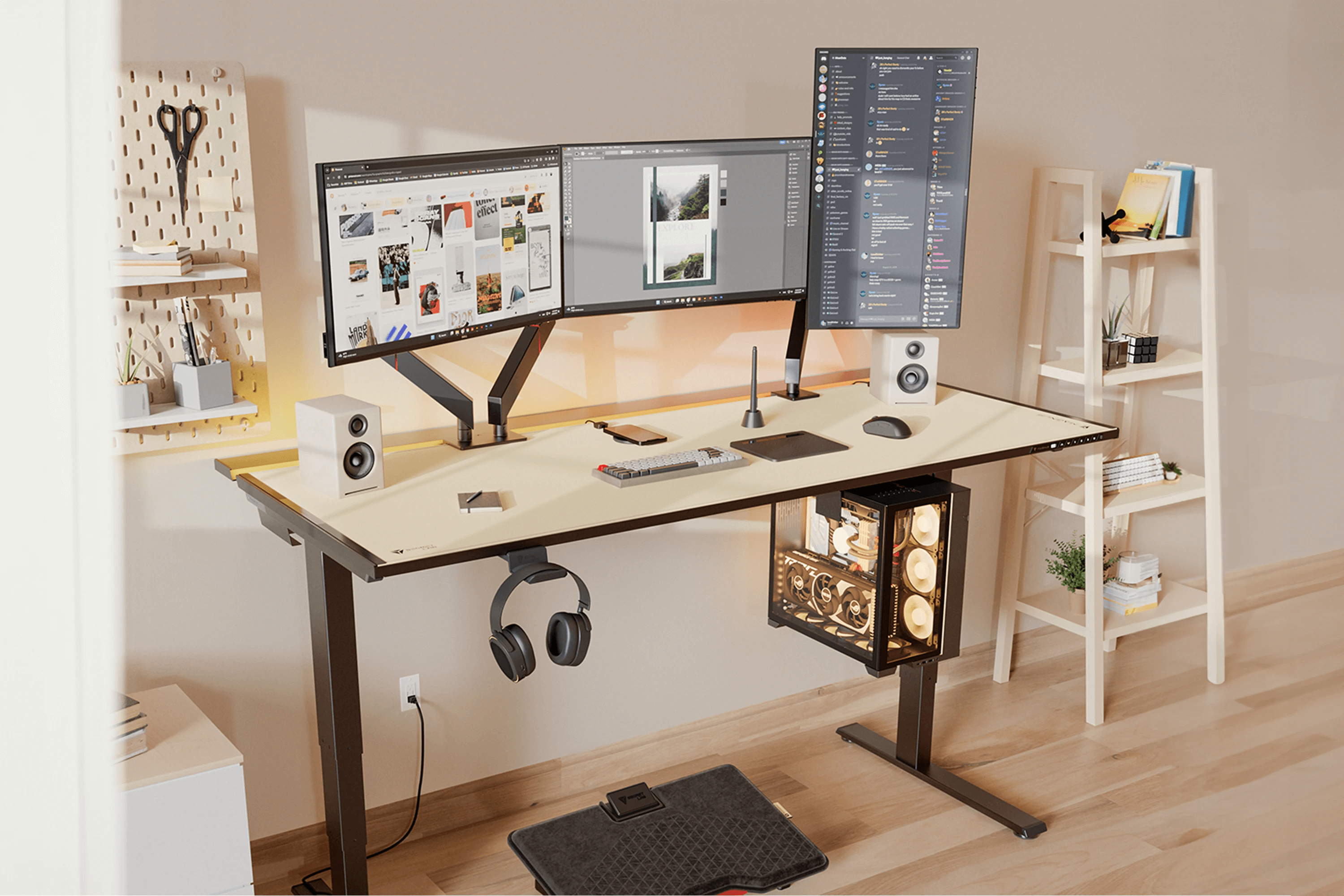
Secretlab isn’t the only manufacturer offering gaming desks in the Australian market. Recently, brands like UpDown, Desky, and even Artiss have added “gaming desk” options to their catalogues.
However, because these manufacturers specialise primarily in office-use sit-stand workstations rather than gaming hardware, their gaming desks lack many of the features, ecosystem integrations, and refinements.
I compared the Secretlab Magnus Pro (not the Pro XL) to other standing desks on my list. Here's how it fared:
| Category | Rating (5.0) |
|---|---|
| Build Quality | 4.2 |
| Aesthetics | 4.5 |
| Cable Management | 4.5 |
| Customisability | 5.0 |
| Weight Capacity | 4.0 |
| Lifting Speed | 3.9 |
| Ease of Assembly | 4.0 |
| Value for Money | 4.2 |
| Return Policy | 4.0 |
| Warranty | 3.5 |
| Overall | 4.2 |
Secretlab has a niche, and the Magnus Pro fits it perfectly: a gaming-focused standing desk with excellent build quality, effective cable management, and a robust accessory ecosystem.
6. The 9am Robin PRO
Best for Minimalist Home Workstations

Adjustable height: 65 - 130 cm
Desktop sizes: Up to 160 × 70 cm
Lifting speed: 38 mm/s
The sit-stand desk has the most unique design on my list, which is why I see it as a minimalist’s dream rather than a budget-friendly pick, despite how some reviewers categorise it. And to be fair, it’s not really a budget option anyway; the price starts at over $800 on promotion.
It’s a neat, simple desk, really. In the following sections, I’ll compare it to the premium desks on this list, given its price point.

For build quality, the 9am Home Robin Pro sits closer to the Artiss than to premium models like the UpDown and Desky desks. The desktops are made of engineered wood. This means you don’t get the weight, durability, natural grain, and reliable ageing of solid wood.
While both the Artiss and the Robin Pro use engineered-wood desktops, the Robin Pro is the far more elegant choice. Beyond the premium feel of the surface, the desk has sturdy triangular steel legs, a floating middle support, and rounded desktop corners; a popular design detail in modern standing desks that complements minimalist home setups nicely.
The Robin Pro’s design doesn’t compromise its stability or durability. However, it’s still worth noting that you’re getting a melamine desktop made primarily from melamine-faced chipboard.

For performance, the Robin Pro has a lifting capacity of 125 kg. This puts it ahead of the Artiss budget desk (100 kg), the Secretlab Magnus (120 kg), and even the Stand Desk Pro (120 kg). It also offers an industry-standard lifting speed of 38 mm/s, which is on par with many mid to high-end standing desks.
The control module on the Robin Pro is one of the best-designed interfaces I’ve seen. While it doesn’t offer the four height presets, app connectivity, or USB charging ports found on higher-end models, it does include two height presets along with a sit-stand reminder, an OLED display, and clearly labelled buttons. The layout feels smart and easy to use.
You also get a height range of 65 to 130 cm, making the desk suitable for taller users who require a higher upper limit. The closest alternative is UpDown PRO, which has an upper limit of 129 cm.

One advantage the Robin Pro has over many high-end desks is its integrated cable tray that ships with the desk upon purchase. Premium models, such as the UpDown and Desky, include this as an add-on that can be purchased separately. Robin Pro joins Secretlab Magnus and Stand Desk PRO as one of the few models that ship with a complimentary cable tray.
For add-ons or accessories, 9am Home offers monitor arms and risers, leg covers and privacy boards, desk clamp power boards (which I recommend to complement the cable tray), and desk storage and mats.
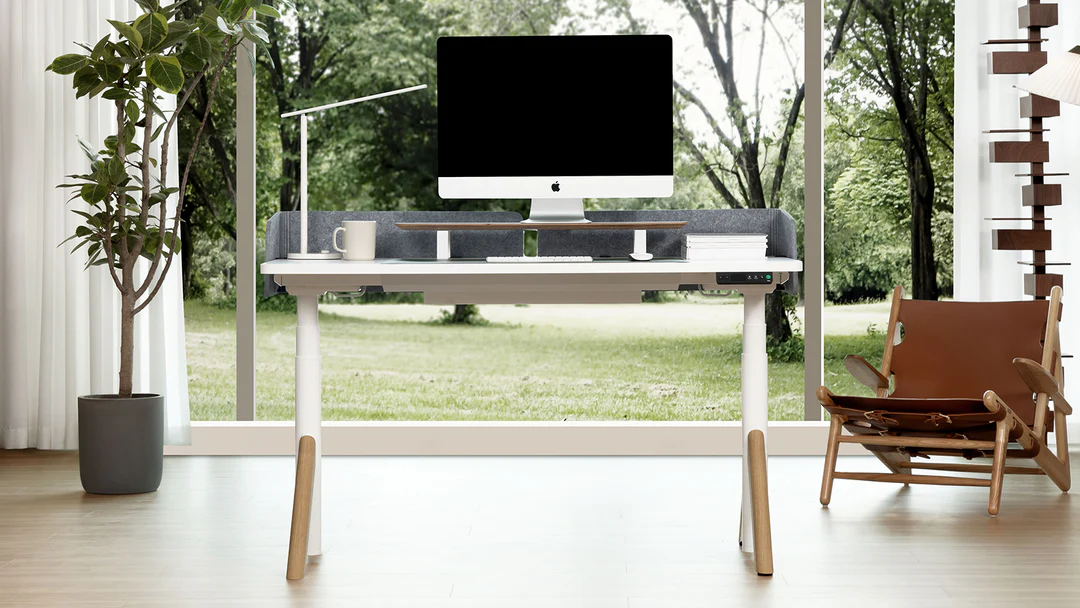
The home sit-stand desk also packs high-end features like the dual-motor system, child locking system, an anti-collision sensory feature, overload protection, and a standard cable management box. For added value, it ships 95% pre-installed and wired, so you have no need for drills.
Finally, warranty and return policies. Robin PRO comes with a 10-year warranty on the desk frames and motors and a 5-year warranty on the desktop. The other control parts, such as the module, come with a 3-year warranty.
The sit-stand desk, however, falls short in its 30-day return policy (better than the Desky Dual), which is incomparable to UpDown and Stand Desk's 100-day return policies. For returns, 9am Home insists that the product
appears "brand new" with no signs of use, installation, or damage [and] is packaged in its original, intact packaging, including all product stickers, receipts, and tags.
The manufacturer will cover the return shipping cost if you receive the wrong product, if the desk arrives damaged, or if it has functional defects. However, returns are limited to orders of no more than two desks.
Cost of the Robin PRO

The 9am Robin PRO Home Standing Desk starts at $1,079 (currently at $849 due to an ongoing promotion) and ranges up to $1,438.00 for its largest desktop. With additional accessories, the total cost, including shipping, can go well over $1,500, which, again, is not budget-friendly.
Here's how it compares:
| Category | Rating (5.0) |
|---|---|
| Build Quality | 3.5 |
| Aesthetics | 4.5 |
| Cable Management | 4.5 |
| Customisability | 4.0 |
| Weight Capacity | 4.0 |
| Lifting Speed | 4.5 |
| Ease of Assembly | 4.5 |
| Value for Money | 4.0 |
| Return Policy | 3.5 |
| Warranty | 5.0 |
| Overall | 4.2 |
9am Robin PRO is a well-built option for those favouring a minimalist design and premium features. Its unique build, steel frames, control panel, weight capacity, and warranty make it a worthwhile investment.
It’s also a good pick if you value aesthetics and pre-assembled convenience over extra durability or a generous return policy.
7. FlexiSpot E7
Best Budget Sit-Stand Desk Alternative

Adjustable height: 58 - 123 cm
Desktop sizes: Up to 182 × 76 cm
Lifting speed: 35 mm/s
The FlexiSpot E7 is a recent addition to my roundup of the best standing desks in Australia. It's not the first time I've come across it researching and testing sit-stand desks, but I've included it now for two reasons:
- The price dropped, more on this below.
- The product warranty, which was 5 years, is now a 10-year warranty on all metal and mechanical parts and components, including motors and electrical components of the sit-stand desk.
So, how does the desk compare with the others on the list? First, let's look at its build quality. FlexiSpot's E7 desk frame is well-built, featuring precise and premium steel construction.

For desktop materials, you have engineered options like chipboard and MDF (medium-density fiberboard), as well as natural or solid surfaces such as bamboo and rubberwood. The chipboard is the least expensive, starting at A$479.99, while the rubberwood is the most costly.
Compared with other desks on the market, this range of materials is reasonably generous. Many budget sit-stand desks, such as the Artiss and some mid-range models, offer only engineered wood options.
Higher-end desks, such as the UpDown and Stand Desk Pro, offer natural wood choices, but at a significantly higher starting price. In that sense, FlexiSpot's E7 offers a good balance with both engineered and solid wood options, without entering the premium price bracket.

For control, the E7 desk features smooth height adjustment, thanks to its dual-motor sit-stand design. The digital control panel has four memory presets to switch between your preferred heights. It also features a USB-A port to keep your device charged while you're working.
As a budget-friendly option, there's no arguing against the fact that it lacks app connectivity via Bluetooth and sit-stand reminders. To be fair, though, it still offers a much more functional and better-designed control panel than the one on the Artiss budget sit-stand desk.
The sit-stand desk is adjustable between 58 and 123 cm and has a dynamic weight capacity of 140 kg with a lifting speed of 35 mm/s. For comparison, the Stand Desk Pro lifts 100 kg at 80 mm/s, the Artiss lifts 100 kg at 32 mm/s, and the UpDown Pro lifts 150 kg at 40 mm/s.

FlexiSpot’s E7 also offers superior cable management compared to the Artiss desk; it ships with a built-in cable tray. And for an even tidier setup, you can add the optional cable management pack for $99.99.
The optional cable management kit includes a cable tray, hook, cup holder, headphone hanger, Velcro strap, 20 cable clips, and a cable organiser, more accessories than most desks provide at this price point. Other accessories available to further customise your Fexispot sit-stand desk are monitor arms, risers, storage, and under-desk drawers.
Besides these, there are also standard safety features that I've come to expect, such as a child lock and anti-collision features.
Assembly is also pretty straightforward. The parts come clearly labelled, the frame pieces align easily, and the instructions are simple to follow. You should be able to put the desk together in under an hour.
For warranty and returns, the manufacturer offers a 10-year warranty on all metal and mechanical components. The desktop is covered separately: bamboo desktops have a 5-year warranty, while chipboard, fiberboard, and solid wood desktops are backed by a 2-year warranty.
The desk also has a 30-day risk-free return policy, and FlexiSpot covers the return shipping cost. It’s worth noting, however, that this policy only applies to orders within Australia. To avoid voiding the policy,
all returned items must be disassembled and repackaged as they were originally received. Items returned in other than “like new” condition will be subject to a 10% restocking fee.
FlexiSpot E7 Rating
At the time of the post update, Flexispot offers good value for money. It features a straightforward assembly process, a sturdy base, an adjustable width, and many valuable and safety features.
Here's how it compares:
| Category | Rating (5.0) |
|---|---|
| Build Quality | 4.5 |
| Aesthetics | 4.0 |
| Cable Management | 4.2 |
| Customisability | 4.0 |
| Weight Capacity | 5.0 |
| Lifting Speed | 4.5 |
| Ease of Assembly | 4.0 |
| Value for Money | 4.7 |
| Return Policy | 3.0 |
| Warranty | 4.5 |
| Overall | 4.2 |
However, keep an eye on the price when making a purchase. I've included it as the best budget alternative, as the Artiss Stand-Up Desk is often out of stock and has varying prices on its website and Amazon store.
If the price of the Flexispot increases closer to the more premium options above, then I would recommend paying slightly more for one of the high-end picks if you can cover the difference.
8. Stando Heavy Duty Standing Desk
Best Sit-Stand Desk for Shared Spaces

Adjustable height: 60 - 125 cm
Frame weight: 85 kg
Lifting speed: 36 mm/s
There are a few sit-stand desks on the Australian market built for shared spaces besides the Stando Heavy Duty Desk. Most standing desks have desktops that can accommodate no more than one or two people working together concurrently due to their limited weight capacity.
Take the UpDown Pro corner desk, for example. While it offers enough surface area for three or four people to work around it, its weight capacity is the same as the rectangular model, making it impractical once you start adding multiple monitors or shared workloads.

The Stando Heavy-Duty Sit-Stand Desk is a complete solution in this regard. It can support a desktop up to 300 cm wide and 120 cm deep, making it ideal for home offices with three or more people or for shared corporate workspaces. For comparison, the largest UpDown Pro frame supports a maximum desktop size of 180 cm by 75 cm, which is significantly smaller.
Additionally, the sit-stand desk has a lifting capacity of 300 kg, which is twice the maximum on the list. So, as long as the desktop space permits, you can have multiple setups. Stando takes this a step further, with four electric motors for smooth and consistent height adjustment.
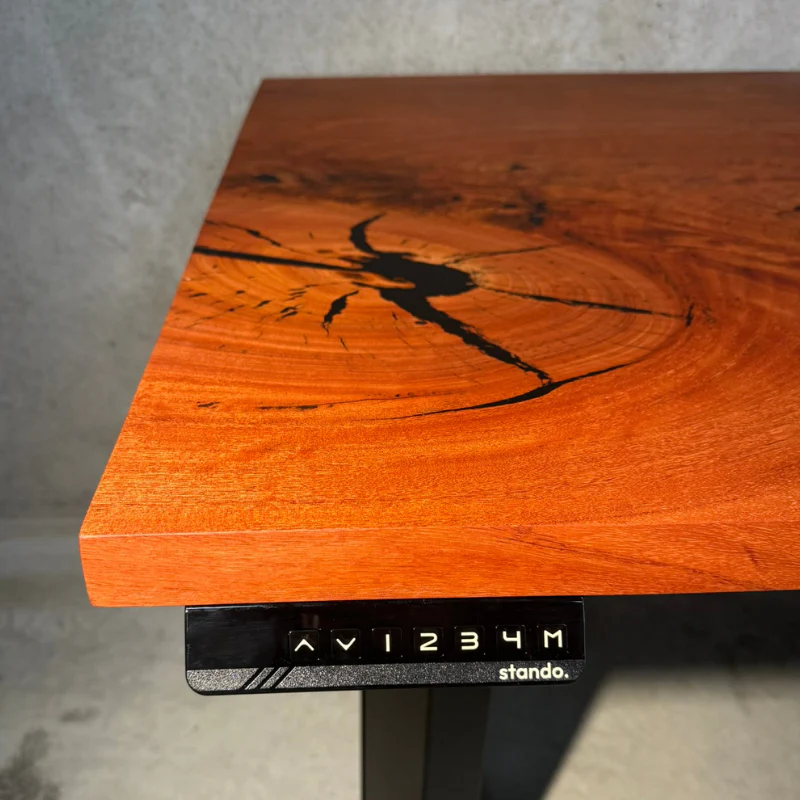
The heavy-duty sit-stand desk uses a simple, no-frills control module for height adjustments. You get a display that shows your current height, and the buttons feel responsive and easy to use. You can mount it on either side of the desktop, depending on what works best for your setup.
The control panel has four memory presets for operation. However, unlike other high-end controls, it does not offer sit-stand reminders, app connectivity, or USB ports for charging your accessories.
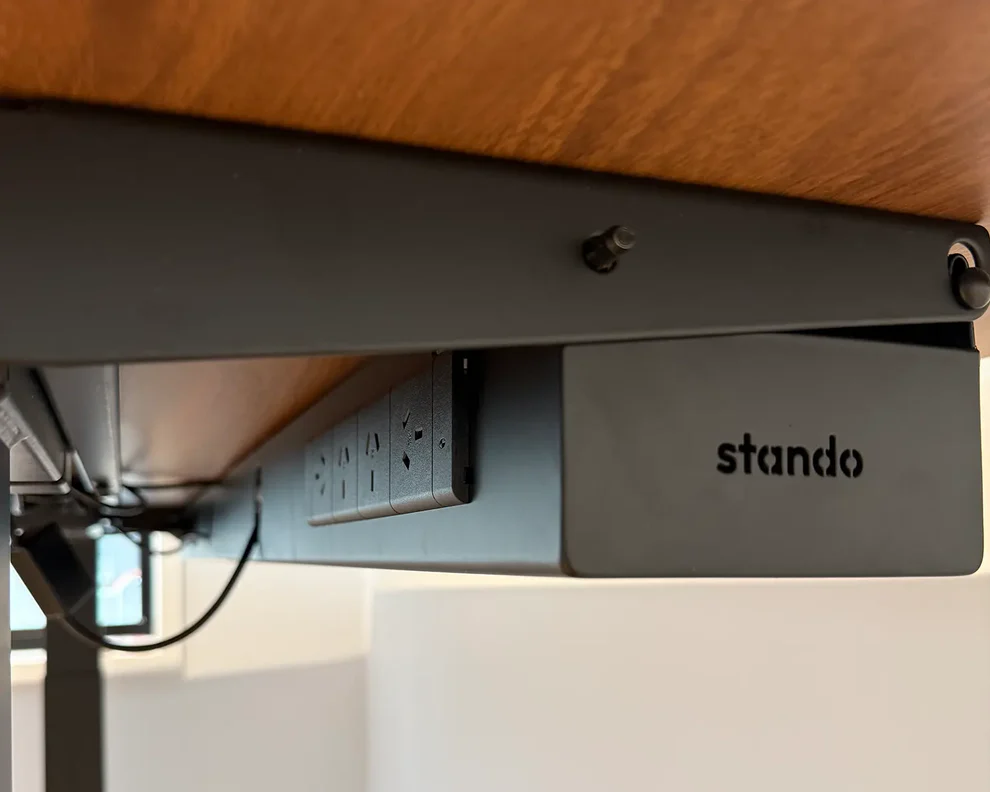
Stando offers a lifting speed of 36 mm/s, just around the industry average, despite packing a higher weight capacity and an anti-collision system to prevent damage, given its weight and strength. The manufacturer also has many accessories to enhance the sit-stand desk. I recommend the cable management channel if you intend to use the desk with multiple devices and users.
Likewise, you can choose from five desktop materials: melamine, woodmatt, hardwood or timber, rubberwood, and bamboo. Across these options, there are 17 different finishes available.
For warranty and returns, the sit-stand matches all the high-end desks on my list. It comes with a 10-year warranty that covers
defects in materials, workmanship and function on all desk legs, lifting motors and structural support parts.
Like most warranties, it excludes normal wear and tear, surface scratches or cuts, and damage from impacts or accidents.

When I last reviewed the Stando desk, the manufacturer didn’t offer a return policy. That has changed. Stando now offers a 100-day money-back guarantee, matching other premium brands like UpDown.
Worth noting is that the return only covers "standard-sized sit-stand desks," which means that if your desk is custom-made, you're ineligible. That is, unless it's defective or "not suitable for use" on arrival. Considering the price, it's essential to make a careful decision.
Final Verdict
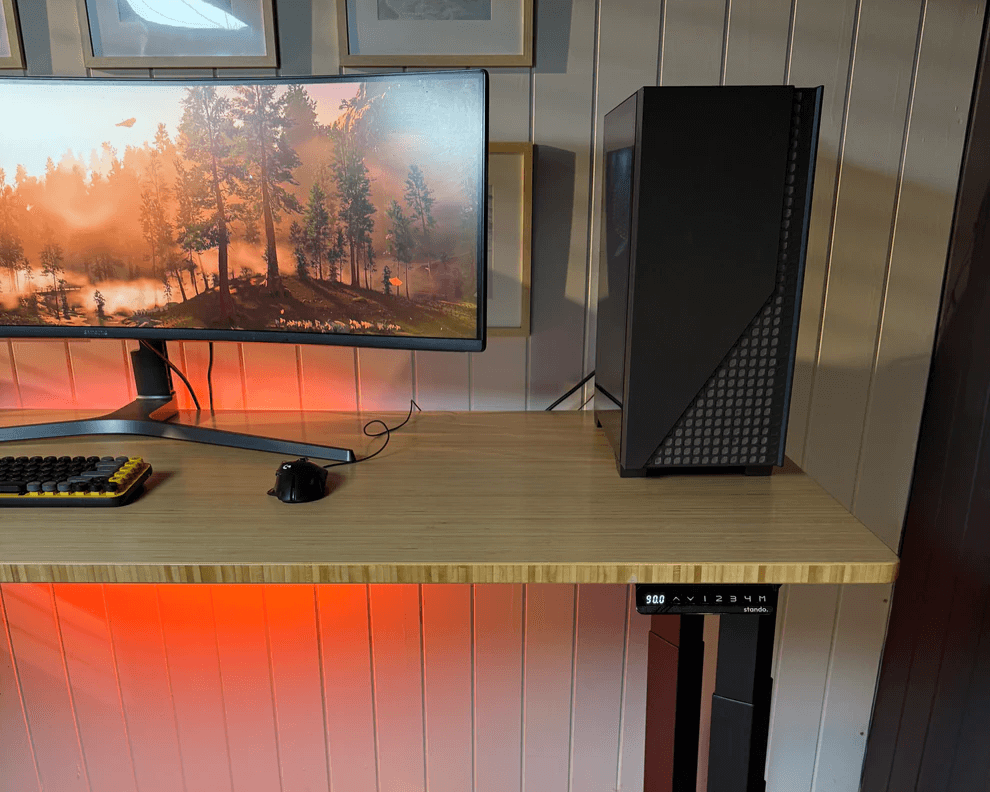
With a 300 cm x 120 cm desktop capacity, 300 kg lifting limit, a four-motor system, and an anti-collision safety feature, the Stando Heavy Duty Standing Desk is the best option for shared spaces.
While it lacks some smart features, it makes up for it with its durability, 10-year warranty, and solid build.
9. Desky Dual Mini
Best Small Standing Desk
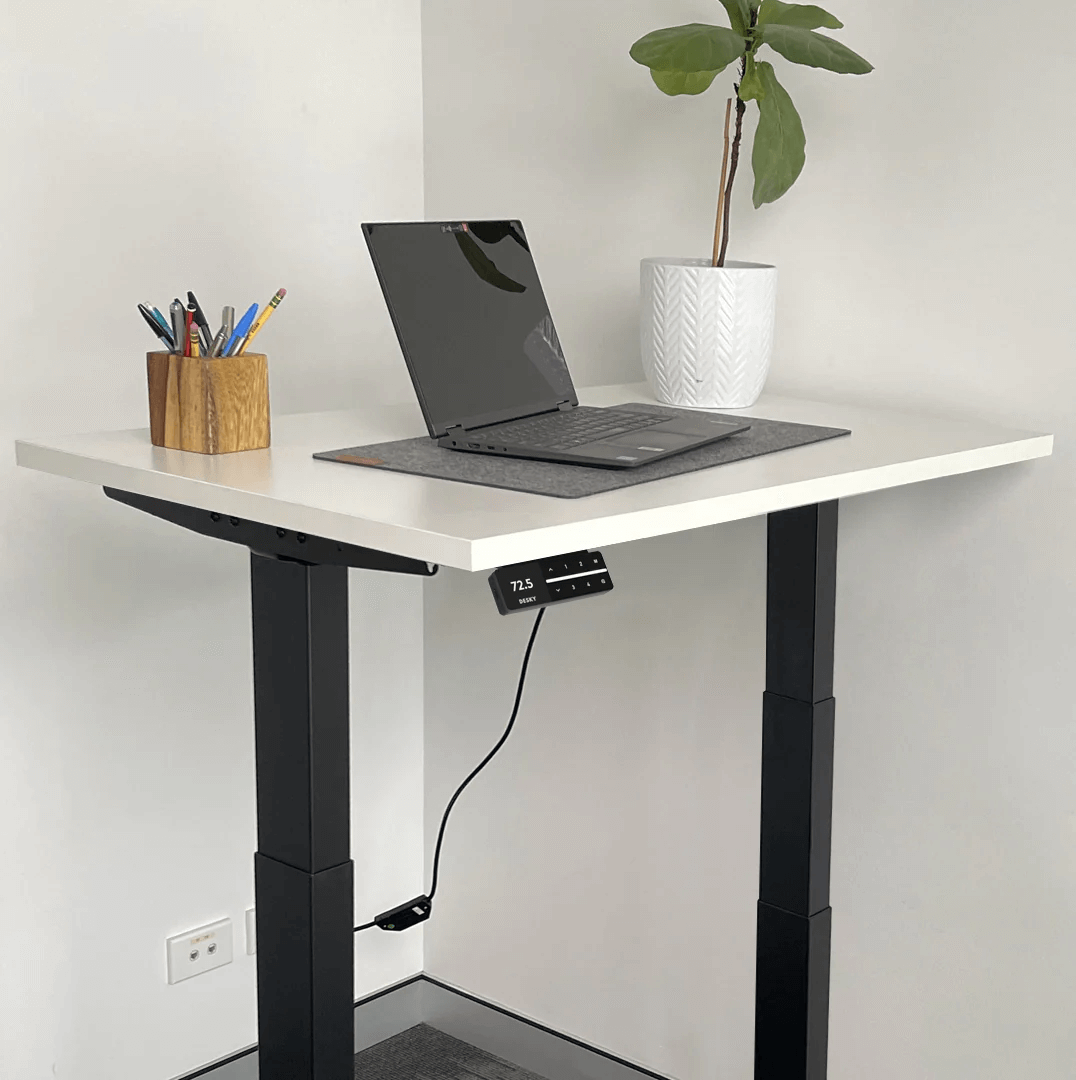
Height adjustment: 54 - 109 cm
Desktop sizes: 80 × 50 cm
Lifting speed: 36 mm/s
If you’re considering a sit-stand desk for your teenager or child, the Desky Dual Sit-Stand Desk is a solid option. At $855, it’s on the pricey side, but it includes all the core features of the full-size Desky Dual.
The size is the biggest difference. The full-size Desky Dual offers large workspaces ranging from 120 to 200 cm wide, making it suitable for multiple devices. The Desky Dual Mini, on the other hand, is for smaller rooms or younger users, with dimensions of 80 to 110 cm wide.
It's hard to compare this sit-stand desk directly to others because it targets a particular user group. But as already mentioned, my initial impression was that the price felt relatively high.
Artiss, for example, sells a dual-motor sit-stand desk for adults at a similar price, and it comes with a much larger desktop than the 80 × 50 cm offered here. You may argue about both desktops' build quality, but I still expected a lower price given Desky Mini's compact dimensions.
Like the Desky Dual, you get a dual-motor design and a 36 mm/s lifting speed. It still has a weight capacity of 140 kg, and it's equipped with child lock safety, anti-collision technology, and a control panel with a USB charging port, four memory presets, and app connectivity.
On purchase, you can only select from two desk colours, black and white, and seven desktop size choices. The Mini Sit-Stand Desk is backed by Desky’s 10-year manufacturer's warranty and 7-day return policy.
Pros
- Dual motor
- High weight capacity
- Safety features and USB port
- Good warranty
Cons
- Pretty expensive
10. Standesk Pro Memory Desk Converter
Best Sit-Stand Desk Converter

Adjustable height: 10 - 54 cm
Keyboard/Mouse tray height: Up to 46 cm
Product weight: 38 kg
While a dedicated sit-stand desk is always the ideal choice, desk converters offer a practical way to turn a fixed-height desk into an adjustable, ergonomic setup. The best desk converter in Australia is the Standesk Pro, an upgraded, motorised version of the traditional Standesk.
The Standesk Pro Memory impresses with its ease of use and smart features, including its memory function that stores up to three height positions. The converter is stable and well-built, showing minimal wobble during height adjustments. Its height range spans 10 cm to 54 cm, making it suitable for a wide range of sitting and standing needs.

The desk converter includes an anti-collision feature to protect surrounding items and an automatic standby mode that reduces power consumption when not in use. With a 50 kg weight capacity, a 90 × 52 cm work surface, and an 80 × 30 cm keyboard tray, it covers all the essentials.
In addition, the Standesk Pro Memory offers a 40 mm/s lifting speed and a compact 50 × 50 cm footprint, making it suitable for smaller desks. The keyboard tray supports up to 5 kg and adjusts from 12 mm to 440 mm above the desk surface, giving you plenty of flexibility for comfortable typing.
At 38 kg, it’s not something I’d call highly portable, but it does offer more flexibility than a full sit-stand desk. Even so, the Standesk Pro Memory remains a premium option, priced from $869.00 for the single-monitor model up to $1,144.00 for the triple-wide monitor variant.
Standesk Pro also includes a VESA plate for easy monitor attachment, rounding out its ergonomic advantages. It’s backed by a 5-year warranty and a change-of-mind return policy within 14 days of purchase.
Pros
- Load capacity of 50 kg
- Very stable and quiet during use
- Electric converter
Cons
- Really expensive
- Not very portable
11. MOOV Desk Loaded
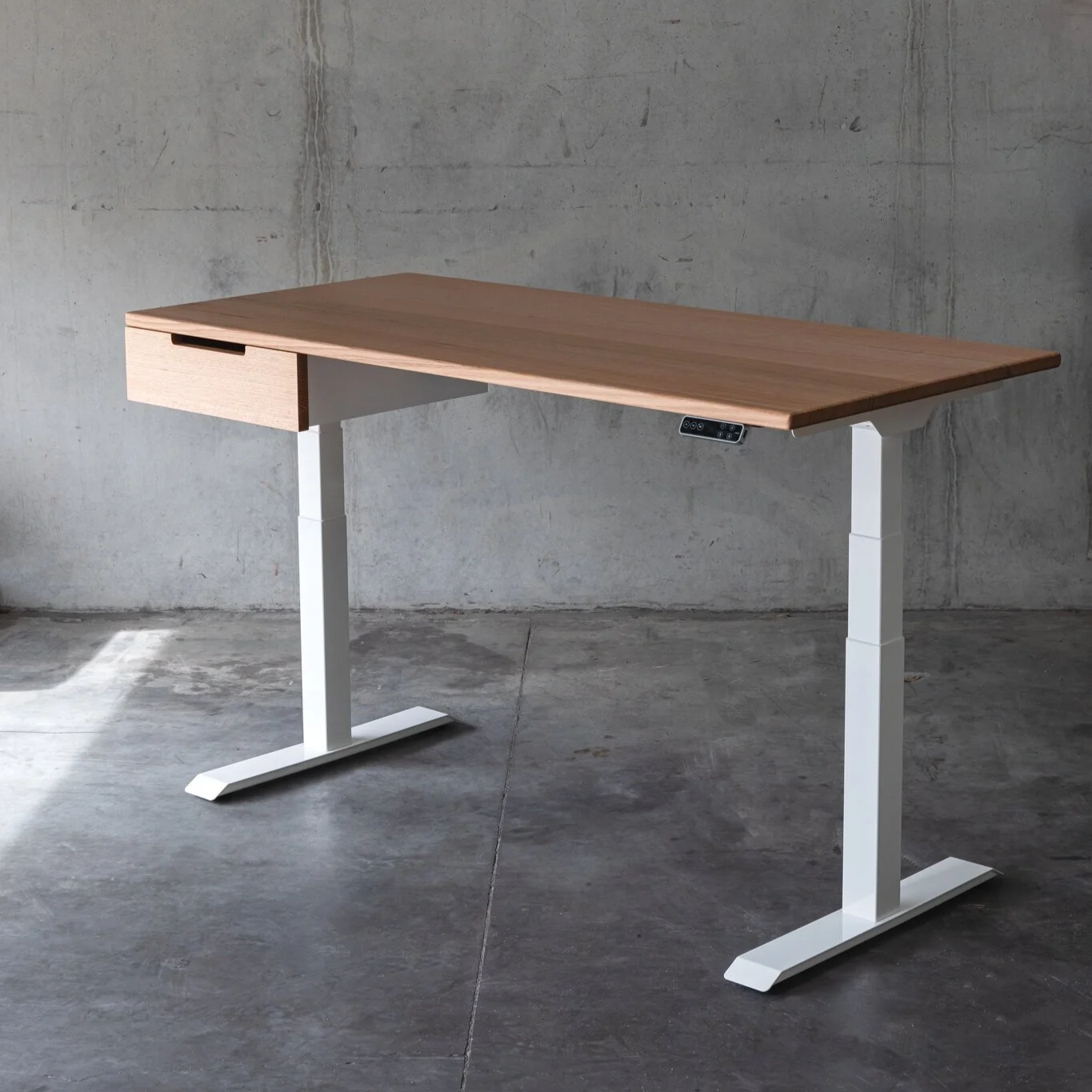
Adjustable height: 60 - 126 cm
Desktop sizes: 180 × 75 cm
The MOOV Desk Loaded is a lovely desk made locally in Melbourne, Australia. Its build quality is on par with brands like Desky and UpDown. However, I have not included it in the top list for two reasons:
- It starts at A$2,799.00. Shipping ranges from $99 in metro areas to an eye-watering $400 in some regional locations.
- Despite the price, its 135 kg weight capacity doesn’t match the performance of UpDown and other competitors.

Unlike most Australian options, the MOOV Desk Loaded does include a wooden drawer and a cable management system at no extra cost. To put that into perspective, I compared it with my top desk picks, factoring in the same accessories that Moov provides for free.
UpDown’s 180 × 75 cm desk with a cable tray and drawer costs $2,151.00 and has a 150 kg weight capacity. Desky’s equivalent setup costs $1,943.80 and supports 140 kg. Which brings the perspective back to MOOV: even with the free drawer and cable tray included, it’s still the most expensive option and has a lower weight capacity than both competitors.
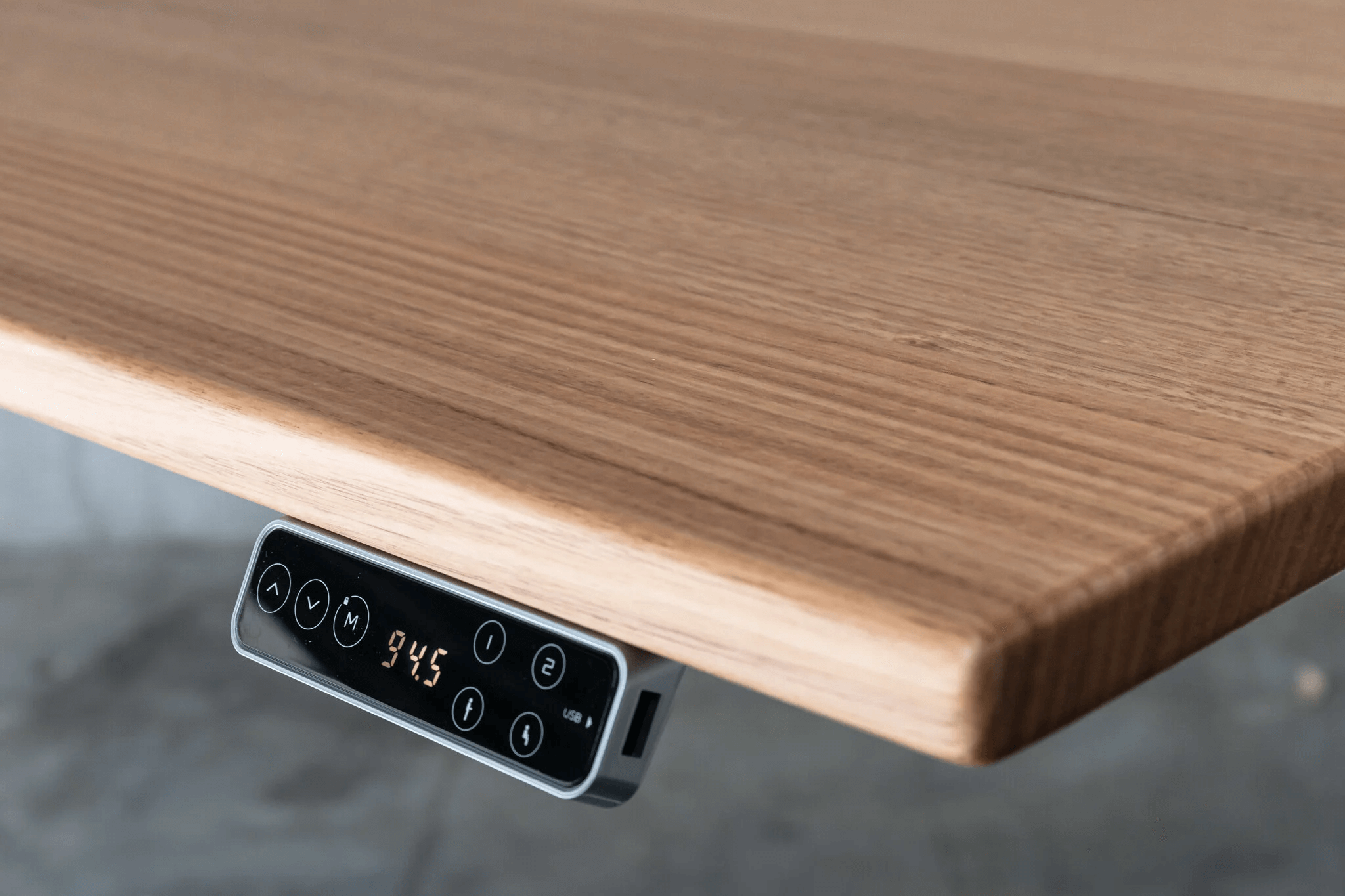
So the price is why it’s not one of my top options. All that aside, the Moov features three undeniably stylish desktop options: Tassie Oak, Blackwood, and Recycled Messmate. You also get a dual motor for reliable adjustments and a control panel with a USB-A port and four memory presets.
For safety, the sit-stand desk features anti-collision technology during motion and a child-safety lock. It’s backed by a 10-year warranty on the frame and a 5-year warranty on electrical components.
Pros
- Premium build quality
- Includes wooden drawer and cable management
- Safety features
- 10-year warranty
Cons
- High cost
- Limited wight capacity
- Available only on pre-order
- No return policy
12. Officeworks / Elite / JasonL / Kogan

Officeworks does have a couple of electric height-adjustable desks with varied desktop finishes, but neither is very compelling to me.
- The most expensive one, the 'Stilford,' would be the best standing desk from Officeworks, but is still made of particle board in all options and has a maximum weight capacity of only 120 kg.
- The cheaper one does not have dual motors, I consider the Artiss a much better cheap option.
Also, from a buying experience:
- You cannot actually try them in-store anyway (presumably, they take up too much space, or they don't want children touching them).
- You choose a particular one, and it is quite likely to be out of stock. If it is, you must pick it up or pay $40 more to get it delivered.
Similar to the Officeworks models, Elite, JasonL, and Kogan brands do not represent a great alternative to a quality stand-up desk brand like the UpDown Pro, Desky, or Stand Desk PRO.
- For a premium option that will last you for up to a decade or more, invest in the UpDown Pro or similar models.
- If you are on a tighter budget, then just get the Artiss, which is better value than all the ones you find from these stores.
When you buy directly from the manufacturer, you get more reliable customer support and smoother warranty handling. You also have greater assurance of product authenticity.
13. IKEA Standing Desk
Best IKEA Standing Desk
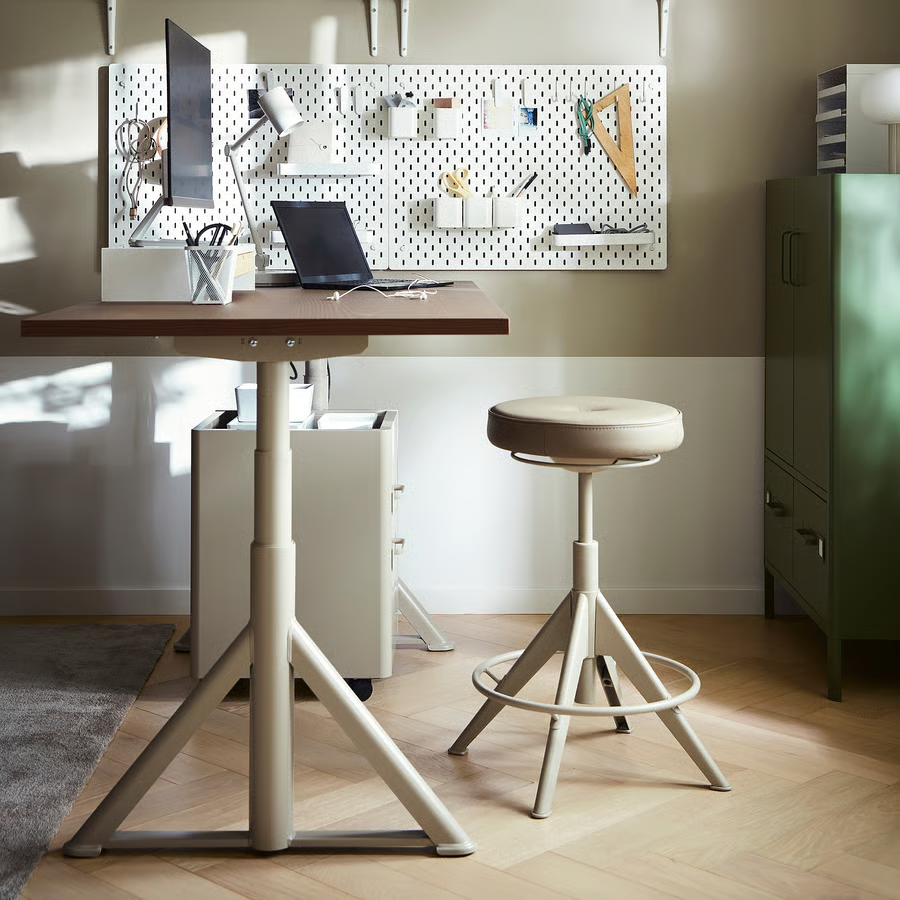
Height adjustment: 63 - 127 cm
Desktop sizes: 80 × 160 cm
Of the two electrically powered sit-stand desks IKEA offers, the IDASEN is a step up in looks and functionality over the BEKANT. However, like the BEKANT and the Artiss, the IDASEN's desktop is made of particleboard.
The tabletop is made of particleboard, melamine foil, and plastic edging, with an adjustable height of 63-127 cm and a load capacity of 70 kg.

IDASEN has one advantage over the Artiss: its height can be up to 127 cm, more than the 120 cm of the Artiss. So, it's better for tall people. Still, I would prefer the UpDown for its better build quality.
In earlier versions of this article, I had the IKEA BEKANT near the end of the list. However, it was cheaper then. At the current price, I cannot recommend it at all; you can get the Artiss or the Flexispot E7.

IKEA's IDASEN sit-stand desk uses a mobile phone app rather than dedicated preset buttons, unlike all the non-IKEA offerings here, which require you to set the height. This is not a feature. It is a gimmick. I do not want to find my phone to set the desk height, so I end up using the manual height adjustment anyway. Plus, you don't get height presets.
It is worth noting two more comparisons between the IDASEN and the Artiss; the price and the load capacity. Artiss wins on both cases:
- Price: Much cheaper.
- Load-bearing: 30 kg more.
This is why the IDASEN is at the bottom of my list.
Just to clarify, at its price point, I am comparing the sit-stand desk with the 140 cm wide desktop option of the Artiss. Read my honest assessment of the IKEA to learn if their desks are worth it.
Discontinued or out of business
In past updates, I've had many standing desks join the roundup and then fall out. Some manufacturers made great desks but have since discontinued their designs or gone out of business.
- The EverDesk by Northday company is still going strong, notably with its ErgoTune chair. However, they decided to discontinue Everdesk and are gradually launching a new design.
- Zen Space Desks were around for a long time and did most things right; their 10-year warranty and 100-day return policy made them an attractive option. Unfortunately, they are now out of business. I still have a prototype of one of their corner desks that I assembled to review and include in my article on the best corner desks.
- Kergo didn't last that long, but it was longer than some; it did have a nice, easy-to-assemble desk design.
Should You Buy a Standing Desk?
This is a personal choice, as the research on the benefits of standing desks is at best unclear. Plenty of studies show that prolonged sitting harms your health, with some linking it to cardiovascular disease, diabetes, and certain cancers.
However, other research suggests that the benefits of standing over sitting are only marginal. Take calorie burn, for example: standing burns roughly 88 calories per hour compared to about 80 when sitting, and some studies put the difference at just 5–10 calories per hour depending on your weight.
I believe using a standing desk can offer long-term benefits, but most of that depends on how you use it. Standing for long stretches isn’t any better than sitting for long stretches. The real advantage of a sit-stand desk is the flexibility it provides; switching between sitting and standing, changing your posture, and keeping your body in motion throughout the day. These habits contribute far more to your health than simply standing still at a desk.
Many people even position a standing desk near a treadmill to add more movement during meetings or light tasks. Others integrate short stretching or walking breaks into their workflow. And, of course, some people buy a standing desk and end up sitting at it all day anyway.
How I Evaluated the Best Standing Desks?
In the introduction, I mentioned the four factors I considered when evaluating all standing desks: quality, price, comfort, and design. But that's not all, there were equally minor important details that distinguished some desks from others that made and didn't make the shortcut.
For starters, some people value practicality, even when the desk is outright ugly, while others put design first at the expense of all else. But I think most people would not want to trade off too much practicality for design. I would argue that a strong fit for purpose is indicative of good overall design. So, for my analysis, I also considered the following as key criteria:
- Practicality – useful space, solid cable management, and dependable build quality.
- Aesthetics – how the desk looks in a space, minimalist or premium.
- Value for money – how well the desk’s features, performance, and build quality justify its price.
These aspects are not in any particular order. I picked the best sit-stand desks based on various angles and price ranges. As you'll notice, I've chosen the best overall standing desk, as well as options for those on a budget, specific niches, desks designed for taller individuals, and more.
In most niches, like gaming and shared space desks, competition and comparison remained well within the niche. For example, the Secretlab Magnus Pro/Pro XL wasn't evaluated against the UpDown PRO to make the list, but other available gaming desks in Australia.
Standing Desks: Naming and Types

Various terms such as "sit-stand desk," "standing desk," "stand up desk," "standing table," "standing up desk," and "stand-up sit-down desk" are often used to describe the distinct types of standing desks that are available in Australia. But there are three main categories you must know:
- Height Adjustable Standing Desks
- Sit-Stand Desk Converters
- Fixed Height Standing Desks
We've looked at 15 height-adjustable standing desks and one sit-stand desk converter in this roundup. I have also purposely ignored Fixed-Height Standing Desks in this guide, as most home offices lack space for a dedicated stand-only desk. It's not something you would normally see in a home, as most people want to sit down at the desk sometimes.
Standing Desk Converters
A converter is an additional piece of equipment that can move up and down. You place it on your existing desk or another flat surface. People tend to buy standing desk converters when they want to save money or space, since they can fold them down and store them away.
Converters offer less workspace and cannot support as much weight as dedicated standing desks. However, they have their use case, so I included one in this list and have recently written a dedicated guide to standing desk converters available on the Australian market.
Adjustable Desk Types
Dedicated standing desks can be subdivided into manually adjusted, pneumatically adjusted, or electronically adjustable models. I have listed only electronically adjustable desks above.
- Manually adjusted desks: height is changed using hand-operated mechanisms such as knobs, pins, or cranks.
- Pneumatically adjusted desks: use gas-spring mechanisms to raise or lower the desk smoothly with minimal effort.
- Electronically adjustable desks: powered by electric motors (single or dual) that raise and lower the desk at the push of a button.
If you have a bad back, you don’t want to be bending under the desk to adjust it manually or cranking a handle every time you change positions.
Likewise, manually adjusted sit-stand desks tend to be less smooth during transitions; nobody wants expensive computers and monitors shaking or sliding around while the desk is being adjusted.
01 - Manual Adjustable Desks

A manually adjusted standing desk has a crank you turn to adjust the height. These desks generally have a dynamic weight capacity of 60-90 kg, meaning you can place up to 80 kg on your desk and move it without worrying about it breaking.
They can hold a monitor, a keyboard, a computer, perhaps some attractive plants, a lamp, and many other desk accessories of your choice. One thing to keep in mind with manual desks is that as the weight on the desk increases, it gets harder to turn the crank to adjust the height.
Manual standing desks are also much cheaper than electric ones, making them a great entry-level option.
02 - Pneumatically Adjustable Desks

Pneumatic desks are often overlooked in discussions about sit-stand options. They use a pressurised air cylinder to raise and lower the desktop. This gives them a clear advantage over manually crank-adjustable desks, which require more effort and are slower to adjust.
However, pneumatic desks often have a lower weight capacity than both manual and electric models. Most perform best with loads under 25 kg. While some models can lift to 70 kg, I haven’t found any in Australia that reach that level, and higher-capacity versions are generally priced similarly to fully electric sit-stand desks anyway. It's easy to see why they're less common.
03 - Electrically Adjustable Desks

The most popular type of standing desks is the electrically height-adjustable models. To adjust the desk’s height, you only need to press a button rather than a crank like the manual desk has. Electrically adjustable desks have a smooth transition between different heights.
The lifting capacity depends on the number and quality of the motors; typically, single-motor models rate from 66 kg to 80 kg. But they are not worth the slower-moving speed and lower reliability.
I suggest you focus on dual-motor models, which can reliably lift significantly more (often up to 200 kg) than any manual or pneumatic desk.
Adjustable Desk Weight
Although most people will not load their adjustable desk to even half its weight capacity, it is essential to know what the desk can lift. Here are two terms to understand in this regard:
- Static rating: the maximum weight a desk can support while stationary.
- Dynamic rating: the maximum weight the desk can safely lift while moving up or down.
For adjustable desks, static weight capacity matters less than the lifting capacity. For example, if you place a 70 kg load on a desk with a dynamic rating of 130 kg, that's 54% of the desk's lifting capacity.
In contrast, for the same load on a desk with a 150 kg dynamic lifting rating, it's only 46%, indicating that the lifting mechanism is under less strain.
Standing Desk Accessories

While an adjustable standing desk is the starting point, it’s useful to remember your home office upgrade may not be complete unless you consider some of the following options:
- Cable management systems
- 'Power bars' with power sockets and USB ports for charging phones
- Monitor arms or stands
- Laptop stands
- Draws or other storage
- Sit-stand stools or chairs
- Balance boards
- Anti-fatigue mats
- Under-desk treadmills
Some of these accessories come packaged with the sit-stand desk, but most are not and are often available as optional add-ons. For a complete setup, I have a dedicated guide covering all the essential standing desk accessories to improve your workspace experience.
How to Build Your Own Sit-Stand Desk?

I often recommend purchasing a complete standing desk directly from a manufacturer because it offers many benefits.
You get
- a warranty period,
- dedicated customer support,
- professionally engineered designs,
- and some useful accessories.
However, it's not the only way to own a standing desk. You could also build one yourself by purchasing the desk parts separately.
To do this, start by researching and choosing a robust, adjustable frame that supports a suitable adjustable height. Most sit-stand desk manufacturers on this list offer affordable desk frames.
Once you have this in place, choose a desktop that fits your style and workspace requirements to complete your desk. This is where things get more DIY, as you can use any suitable wood without making a heavy purchase. Many DIYers often choose reclaimed wood, solid timber planks, or even quality plywood to create a custom desktop that fits their budget.
The DIY process itself is practical and rewarding. It provides a sense of accomplishment and allows you to add personalised features, such as cable management solutions or mounting points.
Standing Desk Deals in Australia
It is worth mentioning that while I keep this article up to date and check both the normal and discounted prices, the deals they offer do not always overlap.
- All of the top-quality manufacturers that sell standing desks in Australia nearly always have some kind of promotion running. So you should take their non-discounted price with a pinch of salt and always compare the final prices you find once you click through to their site.
- Consider what added extras you actually want and what they are worth to you.
- The Artiss is available from many different online stores, so I keep updating these options here to make it easy to find the best deal.
Why Did I Review Standing Desks in Australia?
Some time ago, I decided to get an adjustable standing desk.
The problem was that the Australian market had so many standing desks available and I didn't have the time to research, so I just went to IKEA and picked up something cheap, I ended with the BEKANT. My wife hated it and didn't want it moving with us to our new house! So I started researching something better.
All the existing desk reviews and guides of the best standing desks in Australia were lacking in detail, and they often even got the specs wrong. After looking at these, I decided to invest a chunk of my time in research. The research took much longer than I expected. With more than two weeks of evenings, I decided I would save others' time by sharing my research.
For full disclosure, many of the links in this article are affiliate links, meaning I may get a small commission if you buy a desk I recommend. The ranking is not based on financial incentives, as it didn't start with one, and these desks, in my opinion, are truly the best in Australia.
The commissions this site earns make spending the time writing and publishing new articles worthwhile.
Frequently Asked Questions (FAQs)
Here are some frequently asked questions about the best standing desks in Australia, their appropriate use, and maintenance.
Is a rising desk worth it?
Yes, if you want to alternate between sitting and standing. A good standing desk can help reduce discomfort, break up prolonged sitting periods, and support better posture. It won’t fix everything on its own, but used correctly, it can make your workspace more comfortable and functional.
How long do adjustable desks last?
Most budget and mid-range adjustable desks come with a 3–5 year warranty, and the better brands offer up to 10 years. With regular use and proper care, a quality sit-stand desk should last many years beyond its warranty and remain reliable throughout its lifespan.
Do electric standing desks use a lot of electricity?
No, most standing desks use only about 150 W when in active use. The electric power only powers the hydraulics, pneumatic lifts, or motorised lift system when switching between sitting and standing.
Which size of standing desk is best?
For most people, a desktop between 120–180 cm wide and 70–80 cm deep works best. This gives you enough space for a monitor, laptop, keyboard, and mouse, with room left to move comfortably.
Wrapping Up
There’s no single “best” standing desk for everyone.
The options I’ve recommended all offer strong lifting performance and reliable functionality, with the fundamental differences coming down to design, materials, and price. Choose the standing desktop and frame that best fit your space, your workflow, and your budget.
If you found this research helpful or have any questions about specific models, feel free to reach out in the comments: I’d be happy to help.

